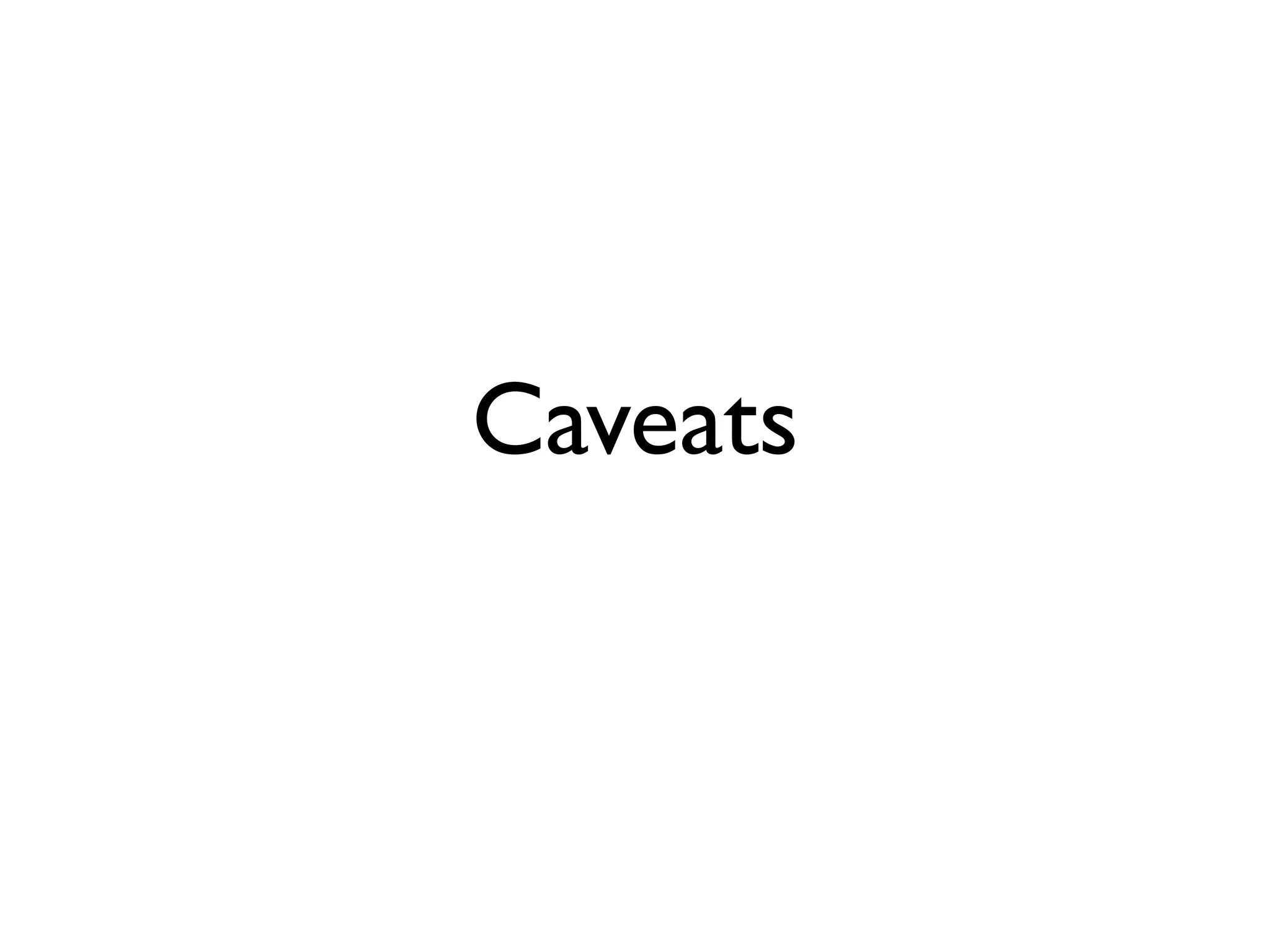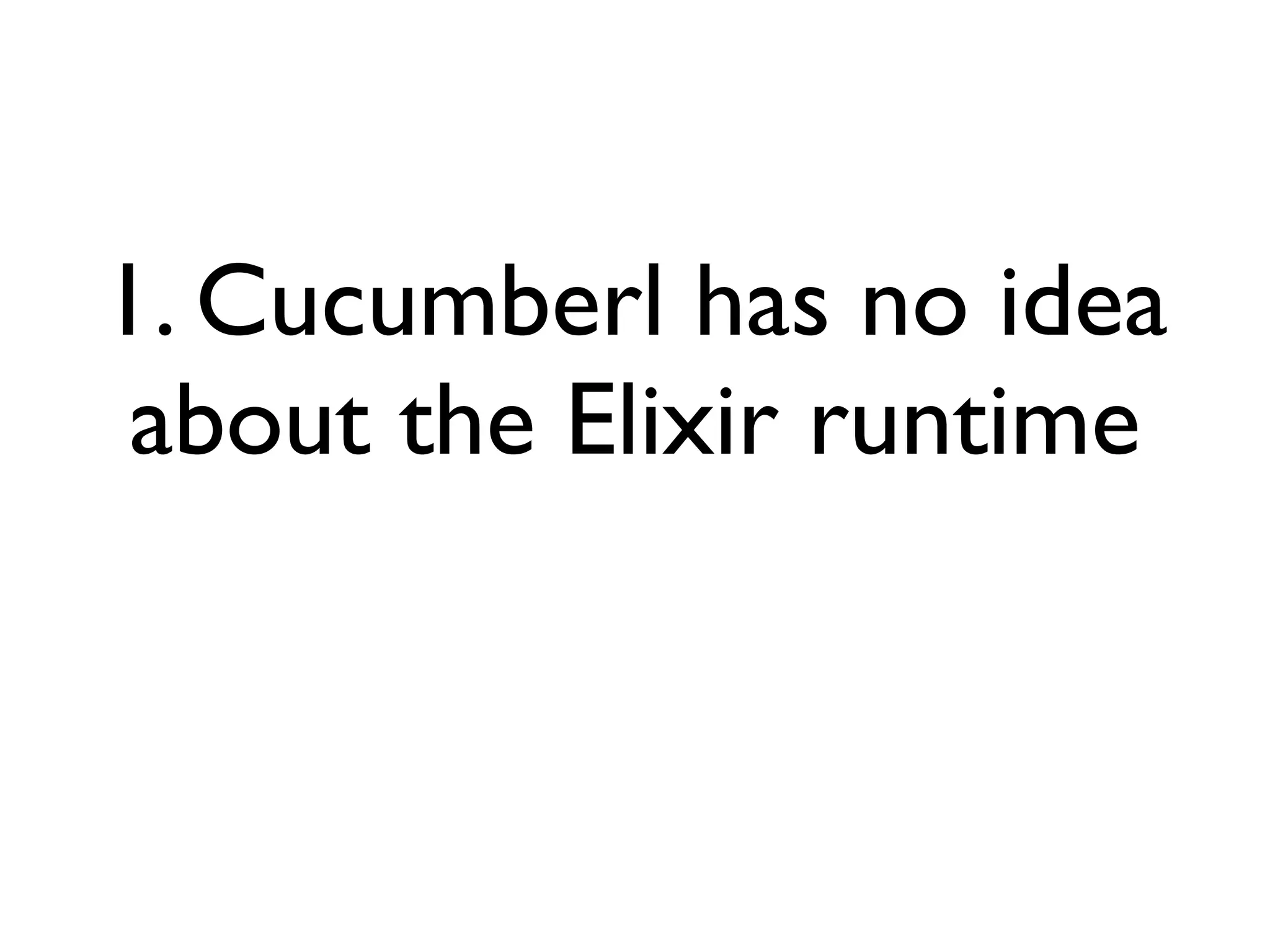The document discusses the benefits of using Elixir for concurrency, highlighting its actor-style concurrency model and pattern matching capabilities, making it safer and easier compared to traditional methods using locks. It includes examples of implementing a feature for managing LED states via the Cucumber testing framework, demonstrating how to define behaviors and run tests in Elixir. Additionally, it notes some limitations of the cucumberl framework in relation to the Elixir runtime.


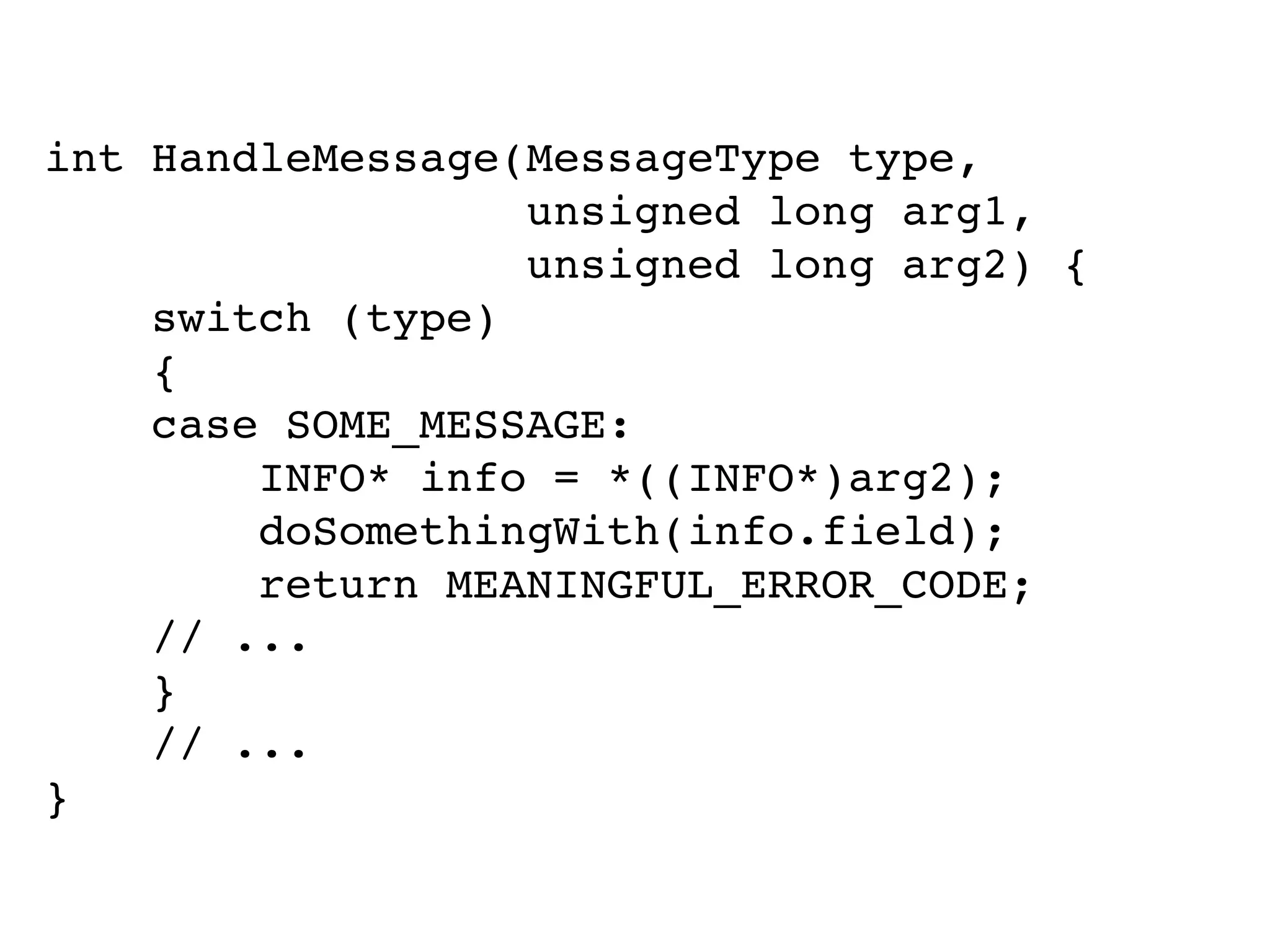
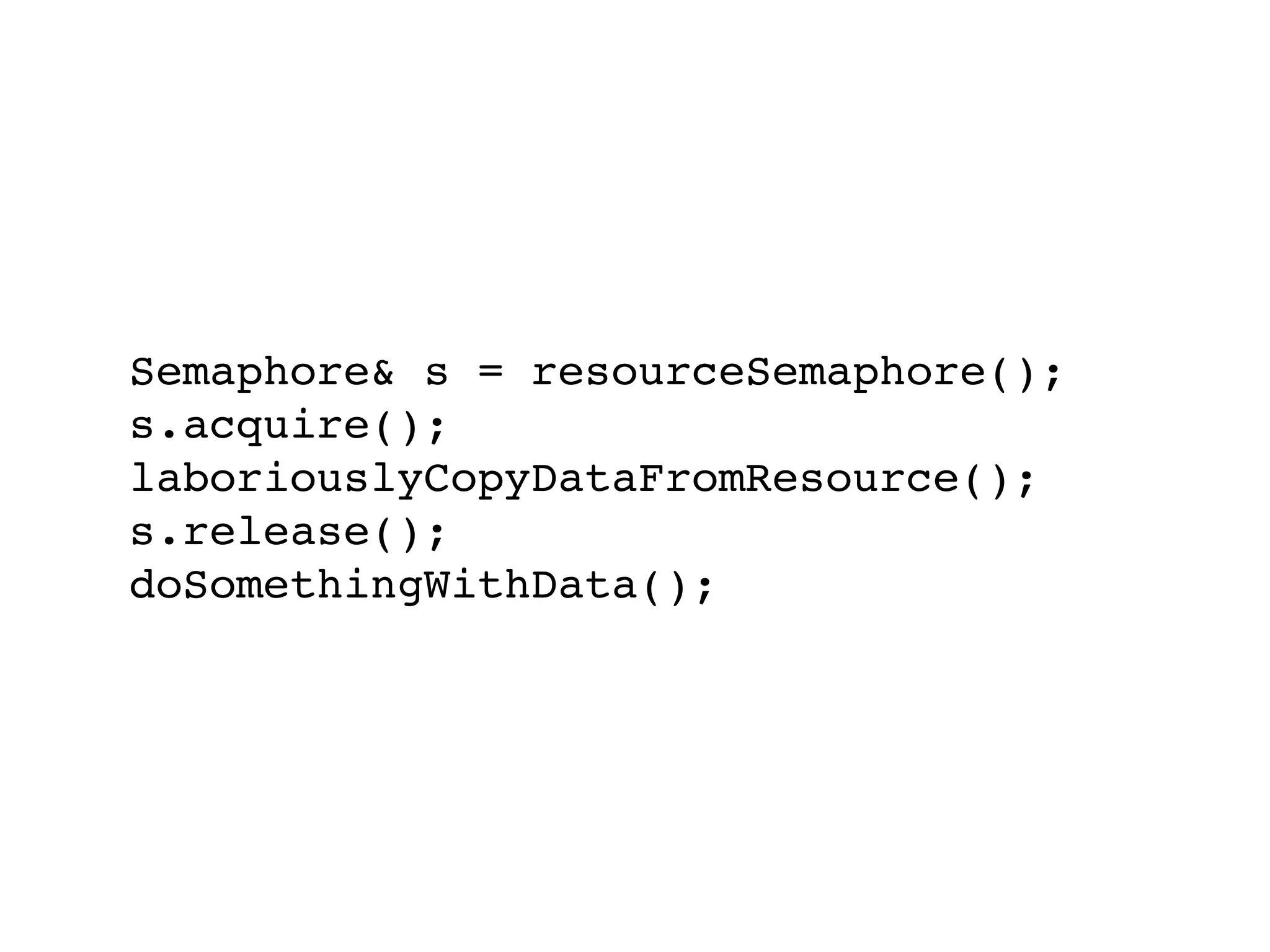
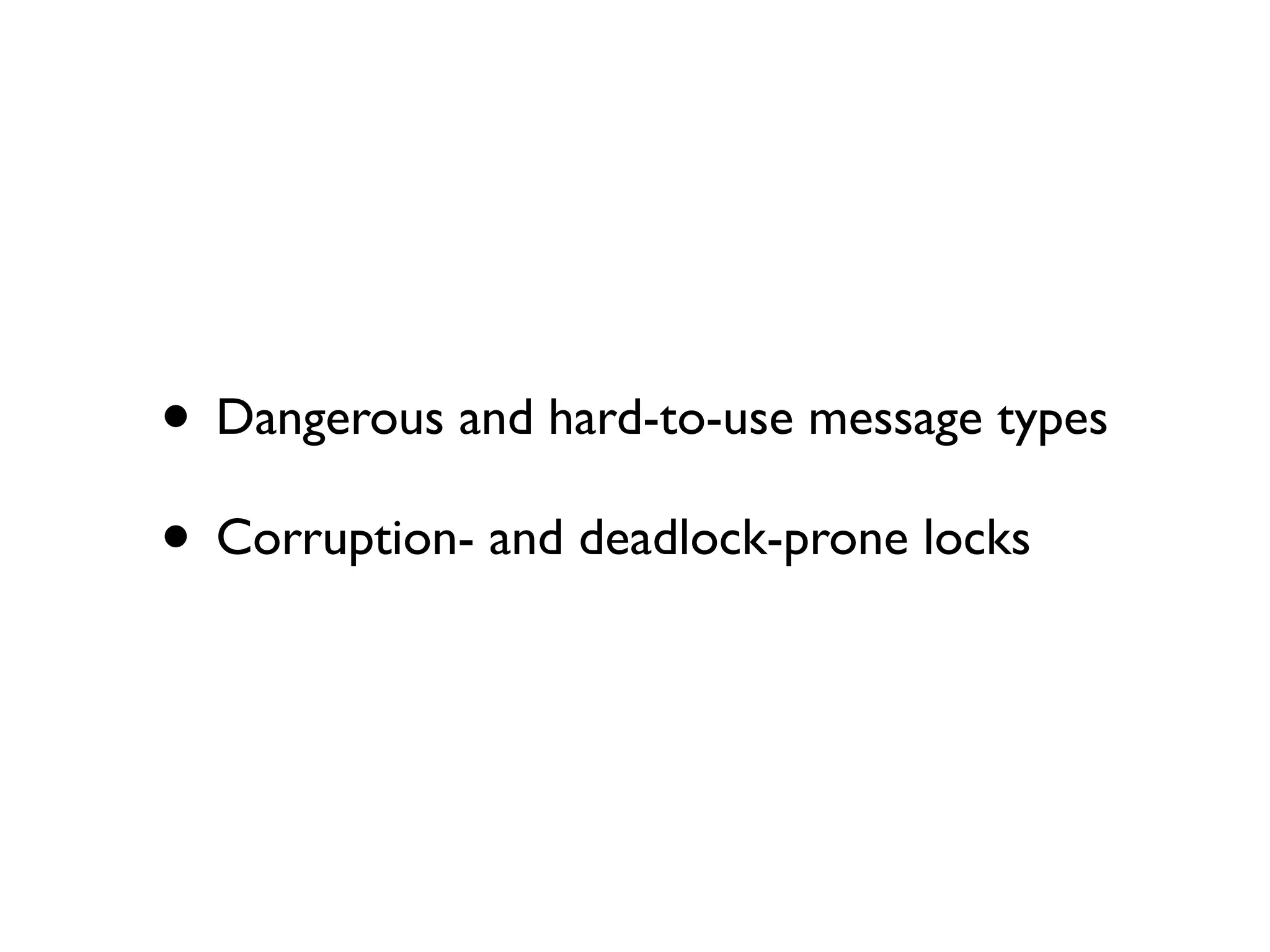


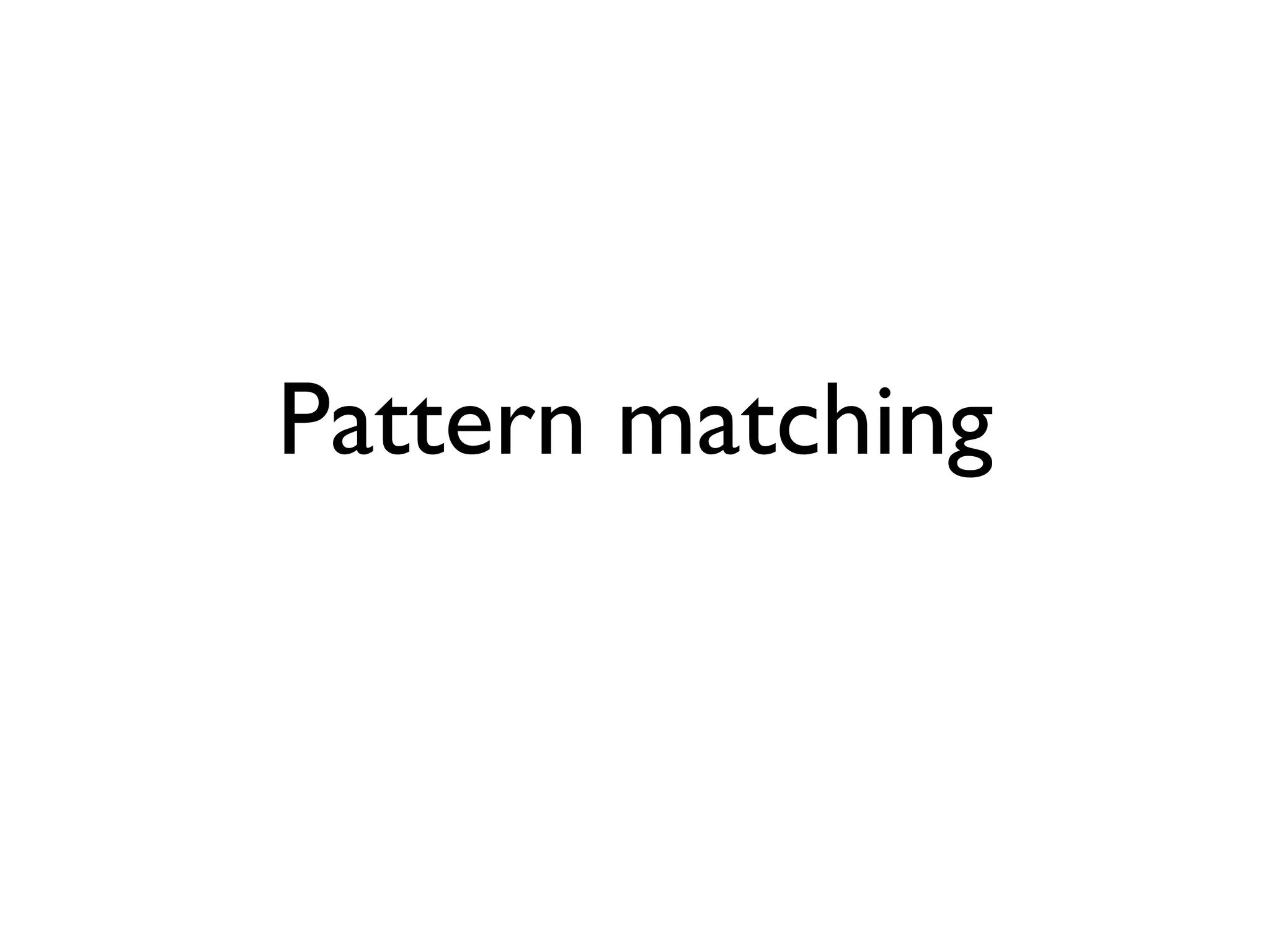
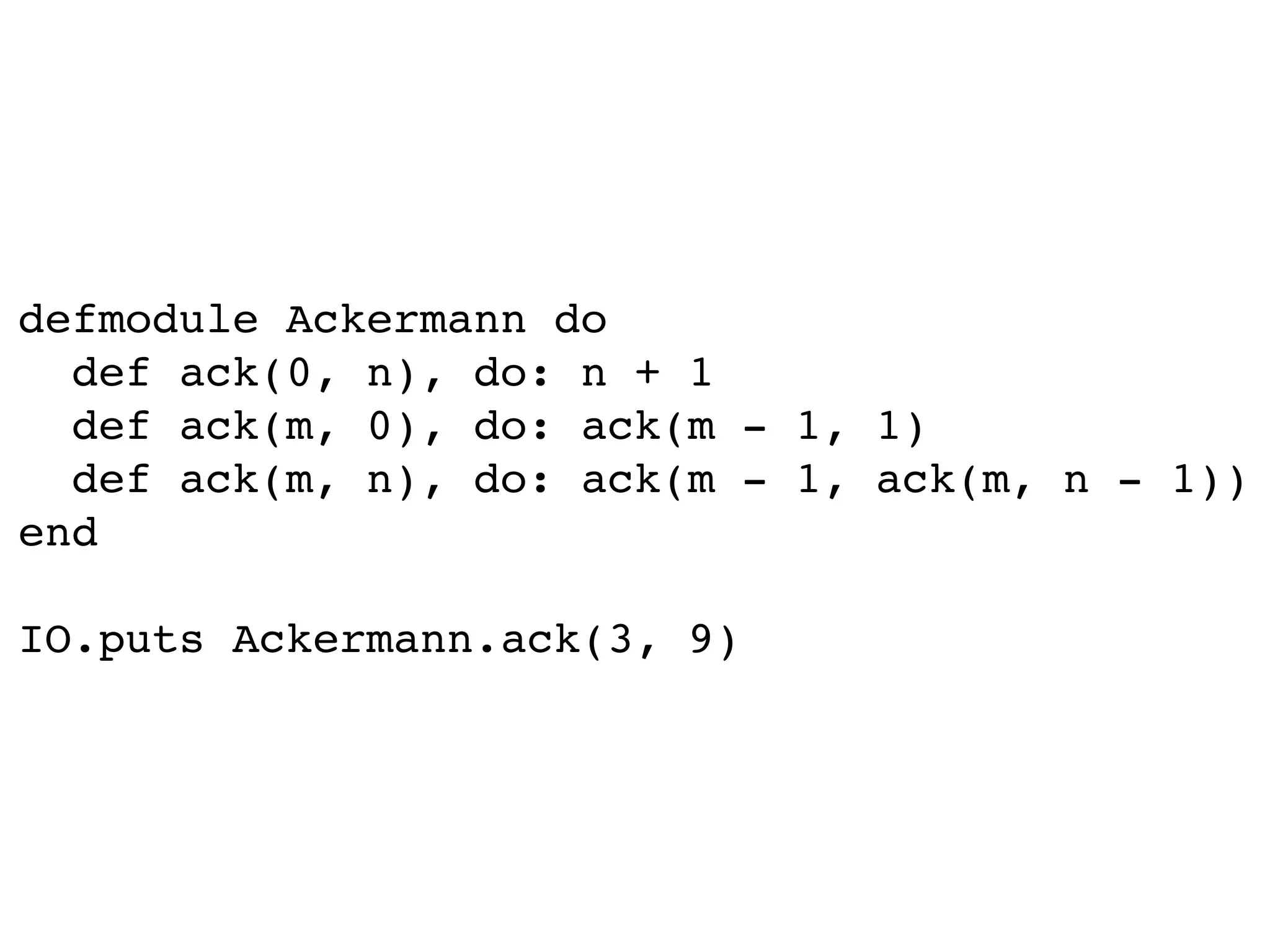

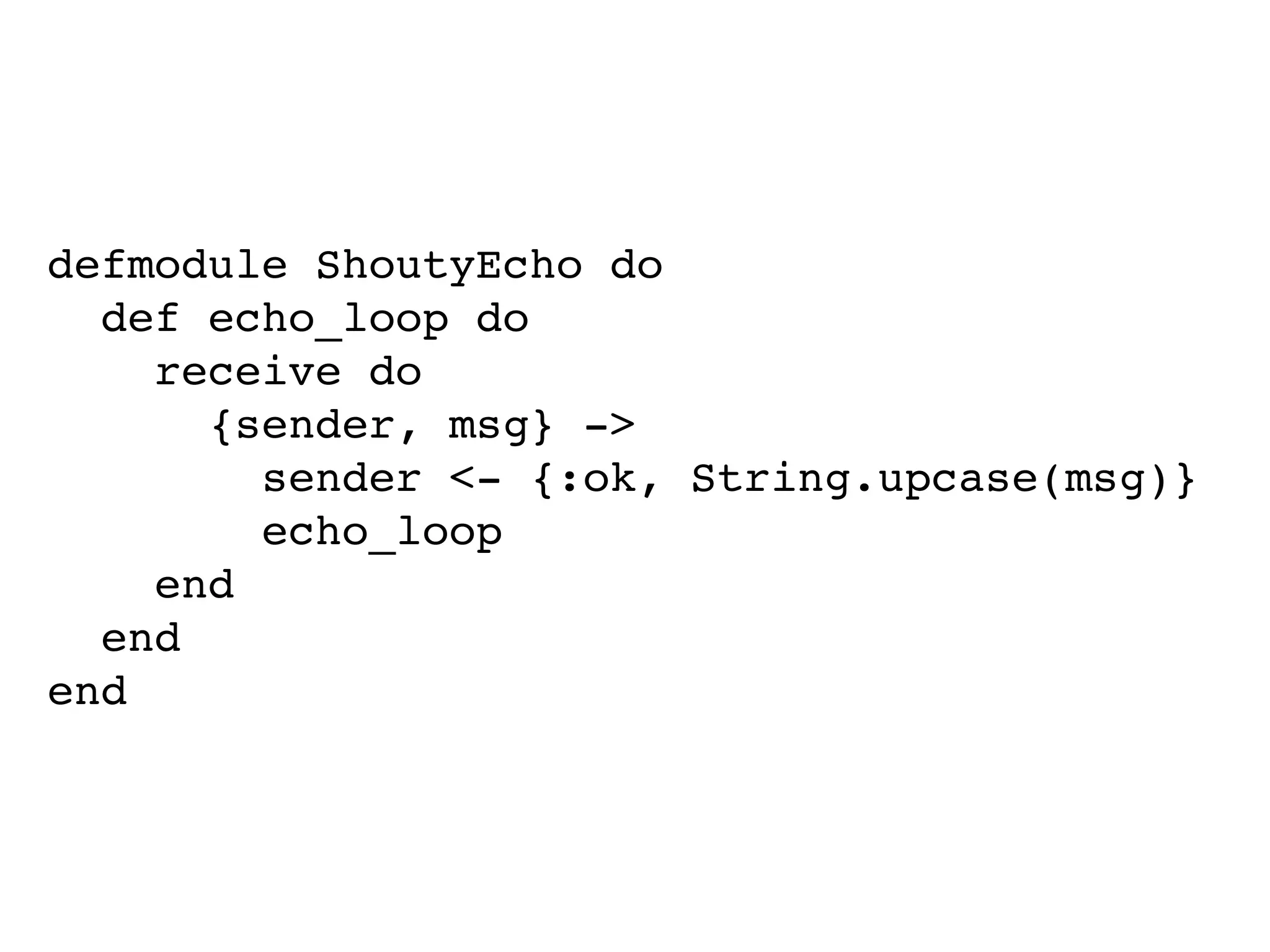
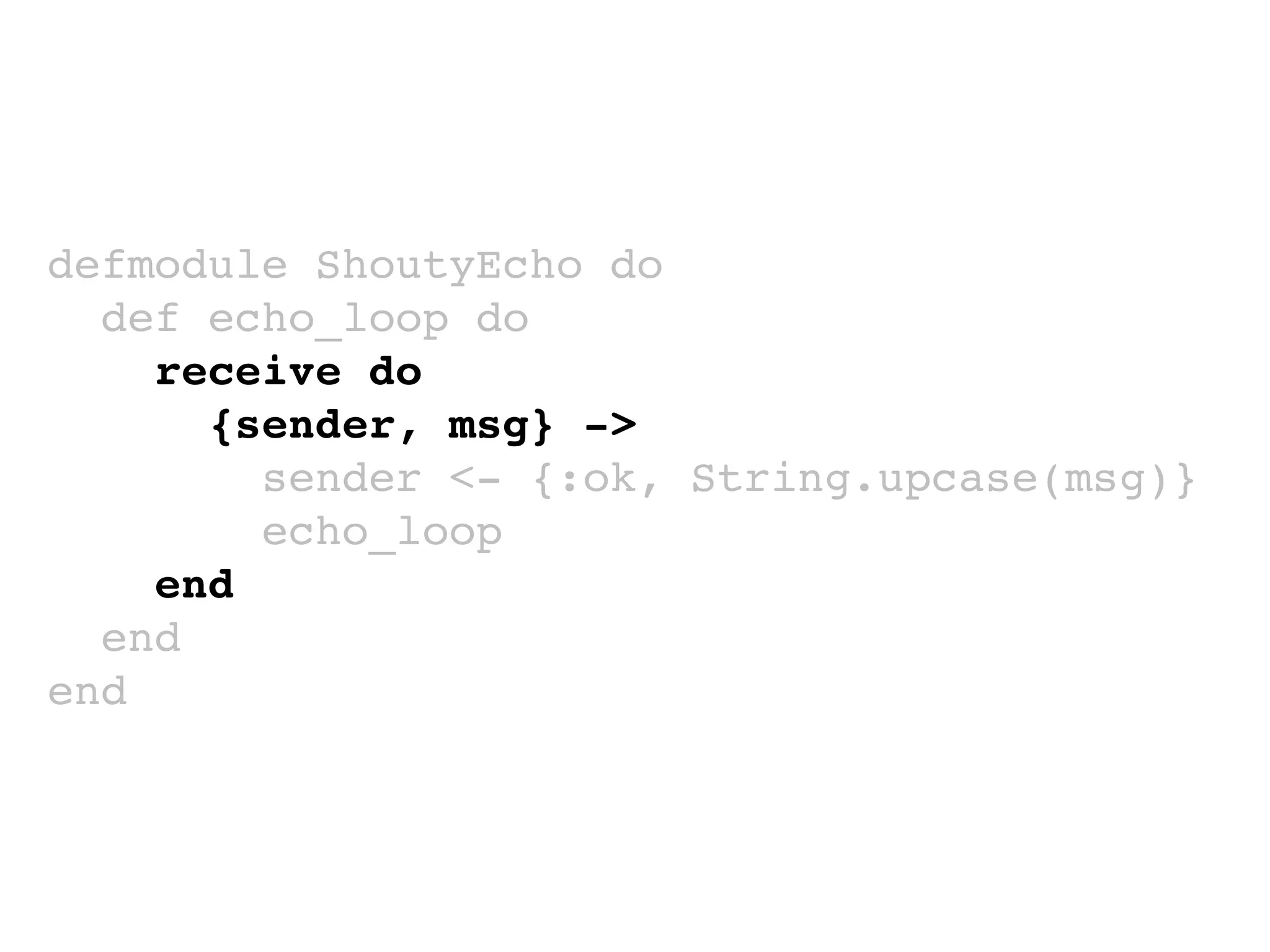
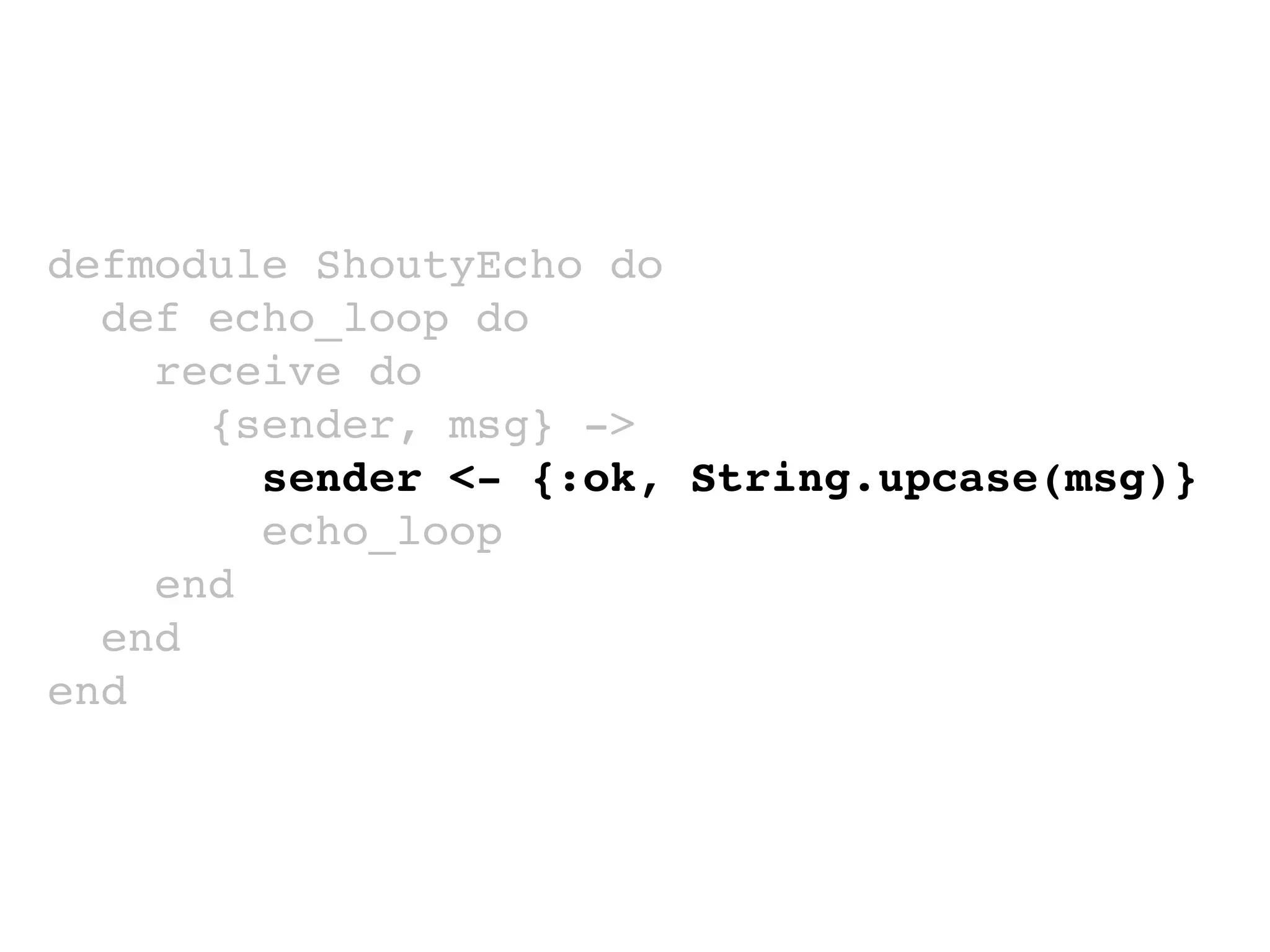
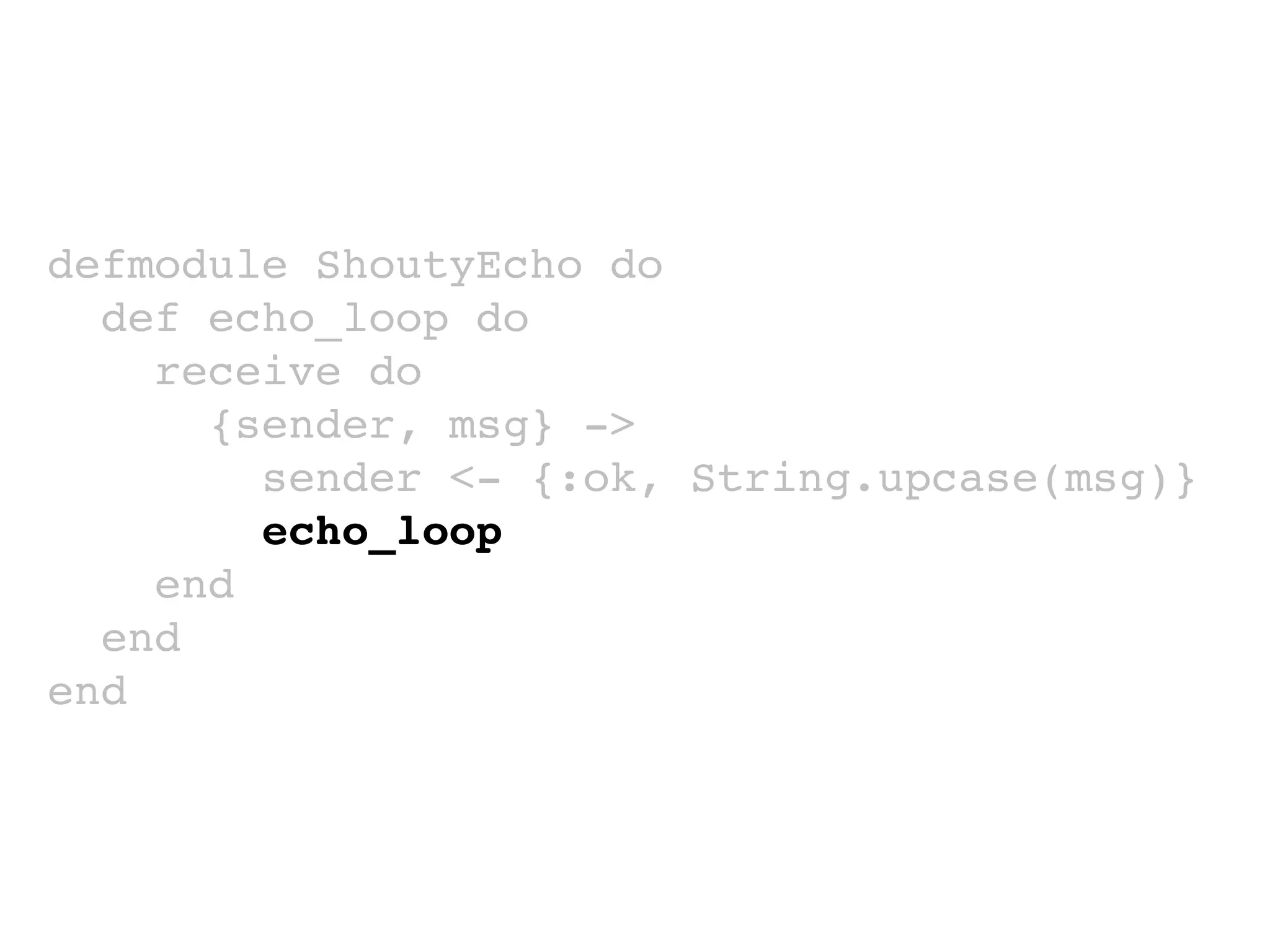
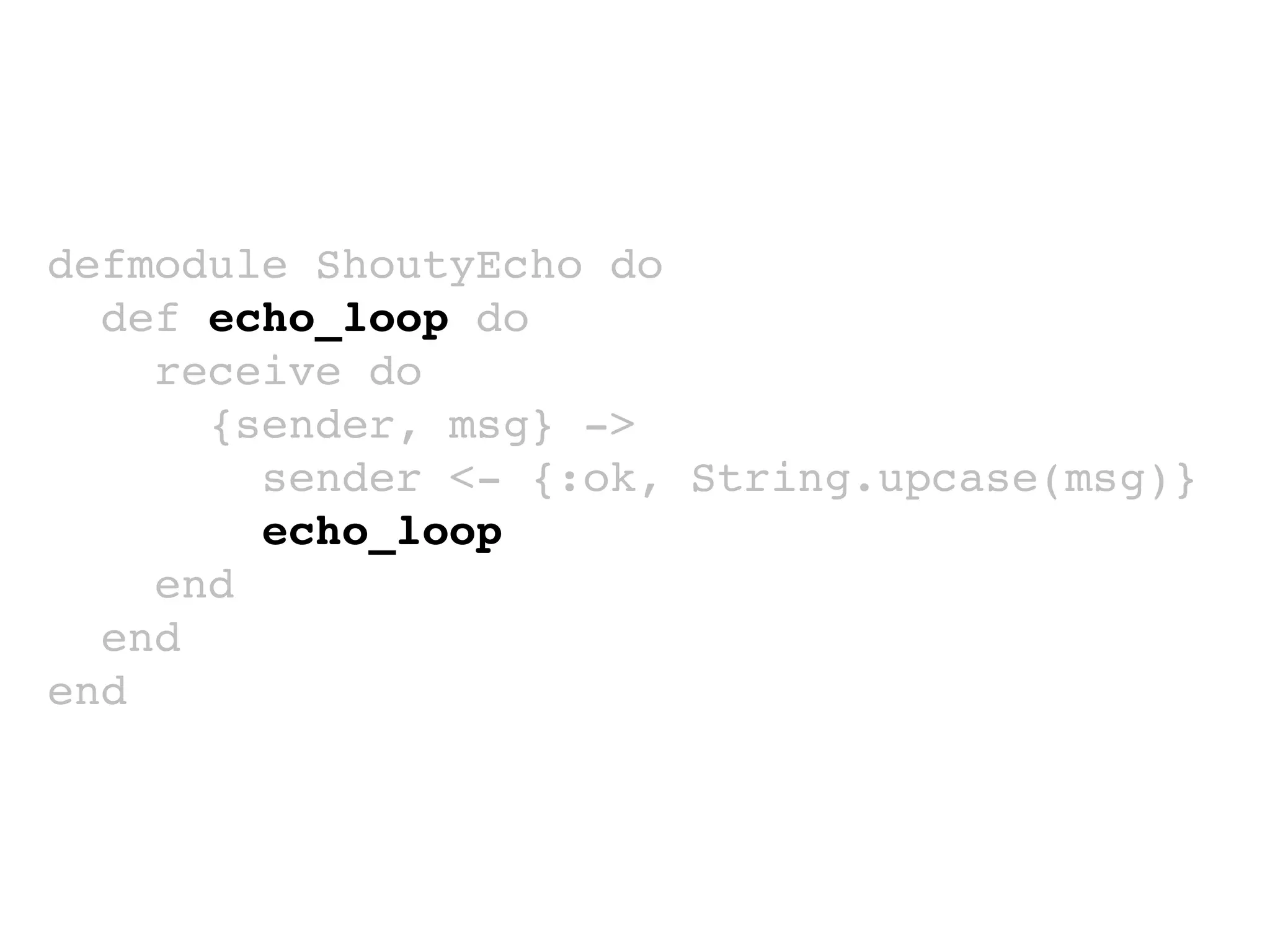
![pid = spawn(ShoutyEcho, :echo_loop, [])
pid <- {self, "Your name here"}
receive do
{:ok, response} ->
IO.puts response
after 500 ->
IO.puts "Done"
end](https://image.slidesharecdn.com/cukeupnyciandeesonelixirerlangandcucumberl-131003044011-phpapp01/75/Cukeup-nyc-ian-dees-on-elixir-erlang-and-cucumberl-16-2048.jpg)
![pid = spawn(ShoutyEcho, :echo_loop, [])
pid <- {self, "Your name here"}
receive do
{:ok, response} ->
IO.puts response
after 500 ->
IO.puts "Done"
end](https://image.slidesharecdn.com/cukeupnyciandeesonelixirerlangandcucumberl-131003044011-phpapp01/75/Cukeup-nyc-ian-dees-on-elixir-erlang-and-cucumberl-17-2048.jpg)
![pid = spawn(ShoutyEcho, :echo_loop, [])
pid <- {self, "Your name here"}
receive do
{:ok, response} ->
IO.puts response
after 500 ->
IO.puts "Done"
end](https://image.slidesharecdn.com/cukeupnyciandeesonelixirerlangandcucumberl-131003044011-phpapp01/75/Cukeup-nyc-ian-dees-on-elixir-erlang-and-cucumberl-18-2048.jpg)
![pid = spawn(ShoutyEcho, :echo_loop, [])
pid <- {self, "Your name here"}
receive do
{:ok, response} ->
IO.puts response
after 500 ->
IO.puts "Done"
end](https://image.slidesharecdn.com/cukeupnyciandeesonelixirerlangandcucumberl-131003044011-phpapp01/75/Cukeup-nyc-ian-dees-on-elixir-erlang-and-cucumberl-19-2048.jpg)

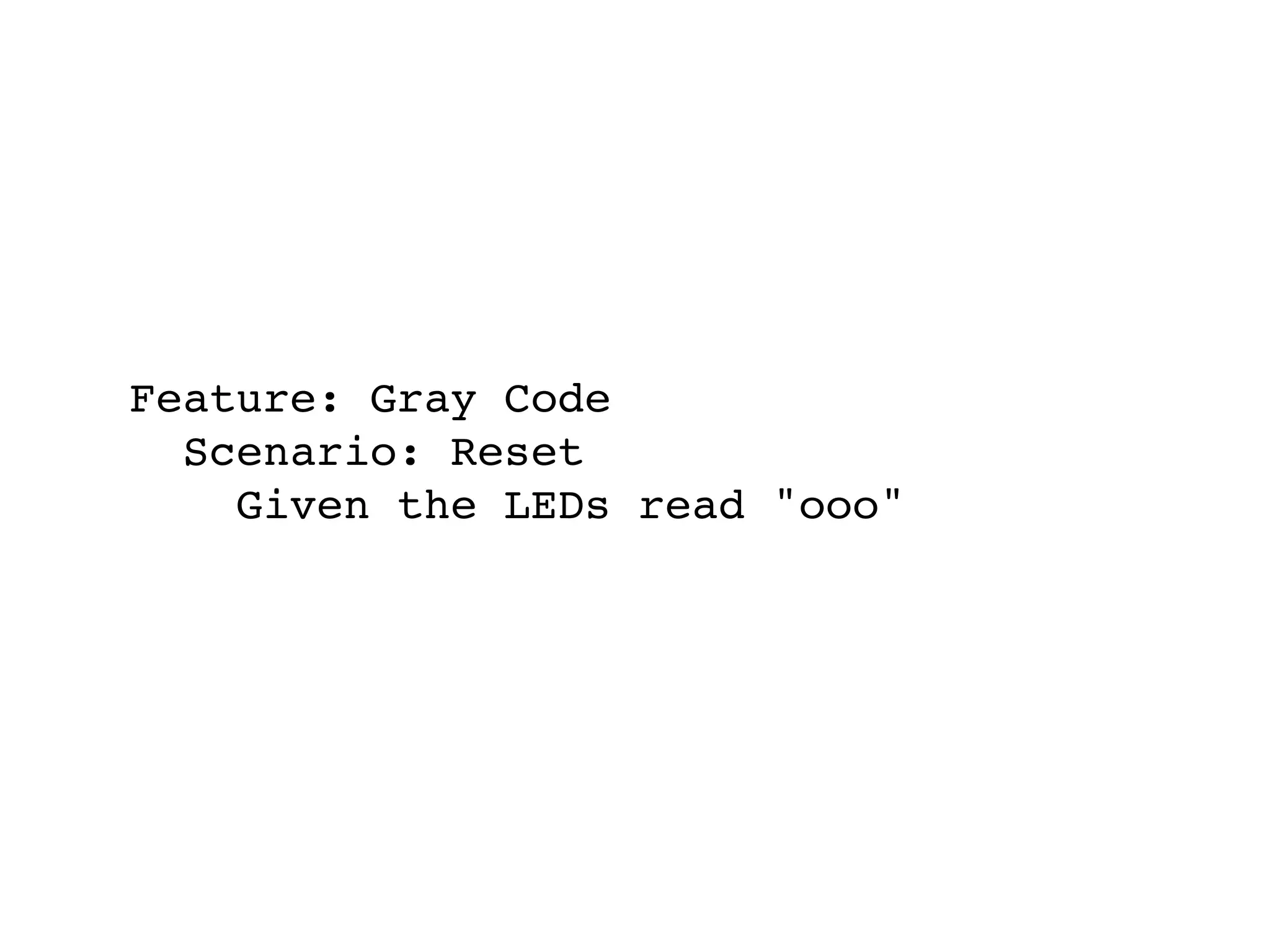
![-module(graycode).
-export([given/3, main/0]).
given([the, leds, read, _Input], State, _) ->
{ok, State}.
main() ->
cucumberl:run("./features/graycode.feature").](https://image.slidesharecdn.com/cukeupnyciandeesonelixirerlangandcucumberl-131003044011-phpapp01/75/Cukeup-nyc-ian-dees-on-elixir-erlang-and-cucumberl-22-2048.jpg)
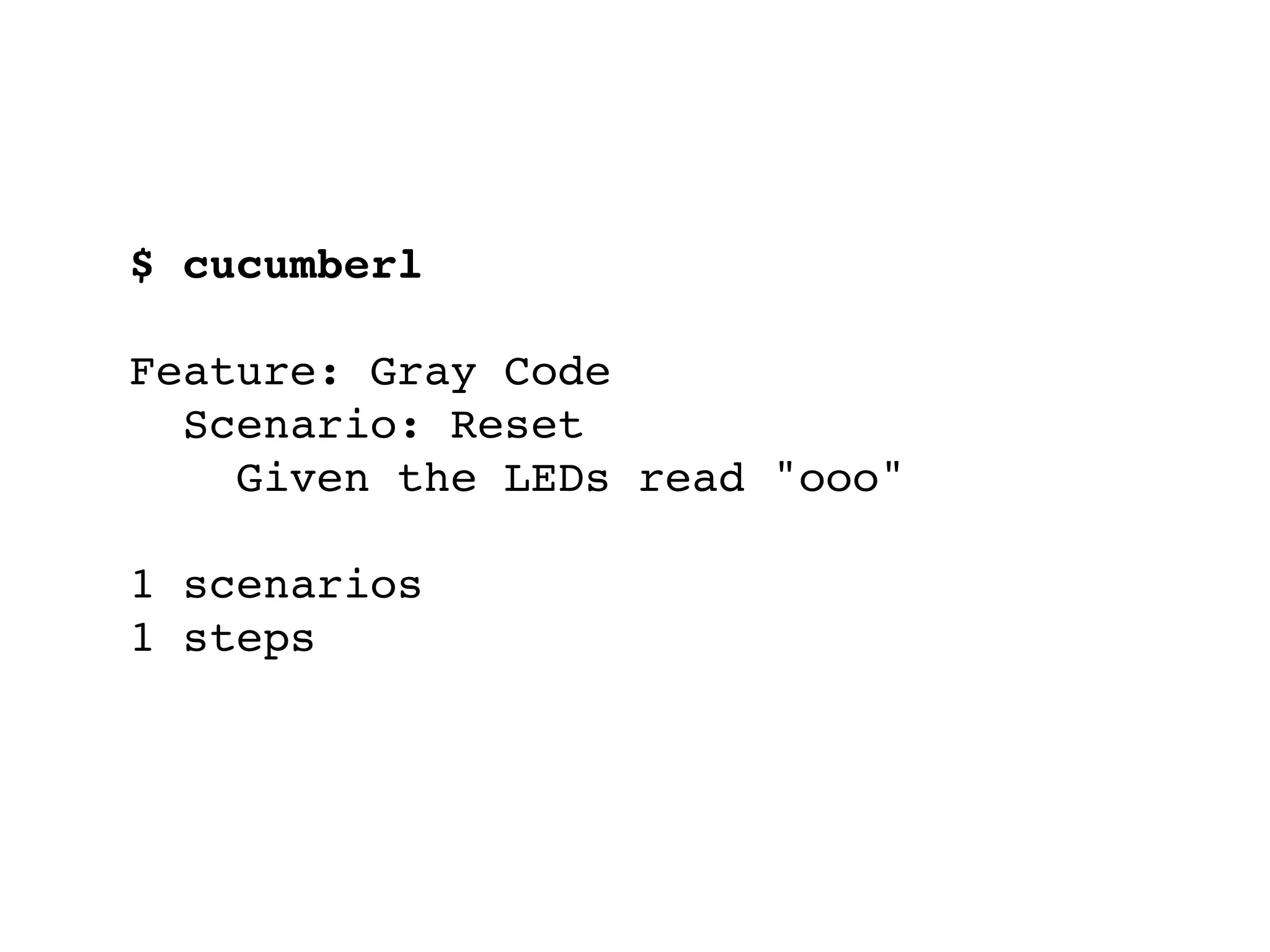
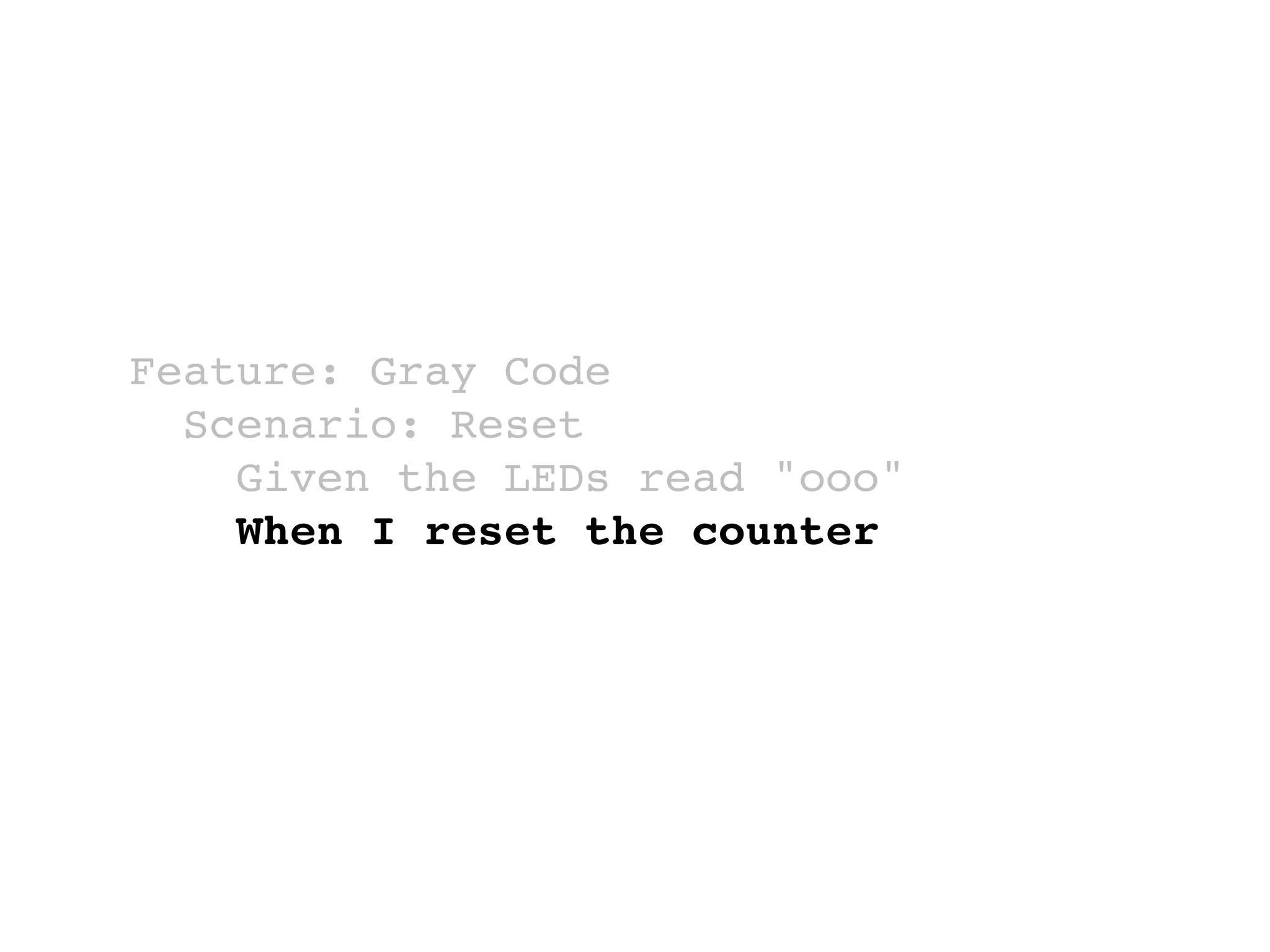
![---------NO-STEP--------
a step definition snippet...
'when'([i,reset,the,counter], State, _) ->
undefined.](https://image.slidesharecdn.com/cukeupnyciandeesonelixirerlangandcucumberl-131003044011-phpapp01/75/Cukeup-nyc-ian-dees-on-elixir-erlang-and-cucumberl-25-2048.jpg)
![---------NO-STEP--------
a step definition snippet...
'when'([i,reset,the,counter], State, _) ->
undefined.](https://image.slidesharecdn.com/cukeupnyciandeesonelixirerlangandcucumberl-131003044011-phpapp01/75/Cukeup-nyc-ian-dees-on-elixir-erlang-and-cucumberl-26-2048.jpg)
![-module(graycode).
-export([given/3, 'when'/3, main/0]).
%% ...
'when'([i, reset, the, counter], State, _) ->
{ok, State}.
%% ...](https://image.slidesharecdn.com/cukeupnyciandeesonelixirerlangandcucumberl-131003044011-phpapp01/75/Cukeup-nyc-ian-dees-on-elixir-erlang-and-cucumberl-27-2048.jpg)
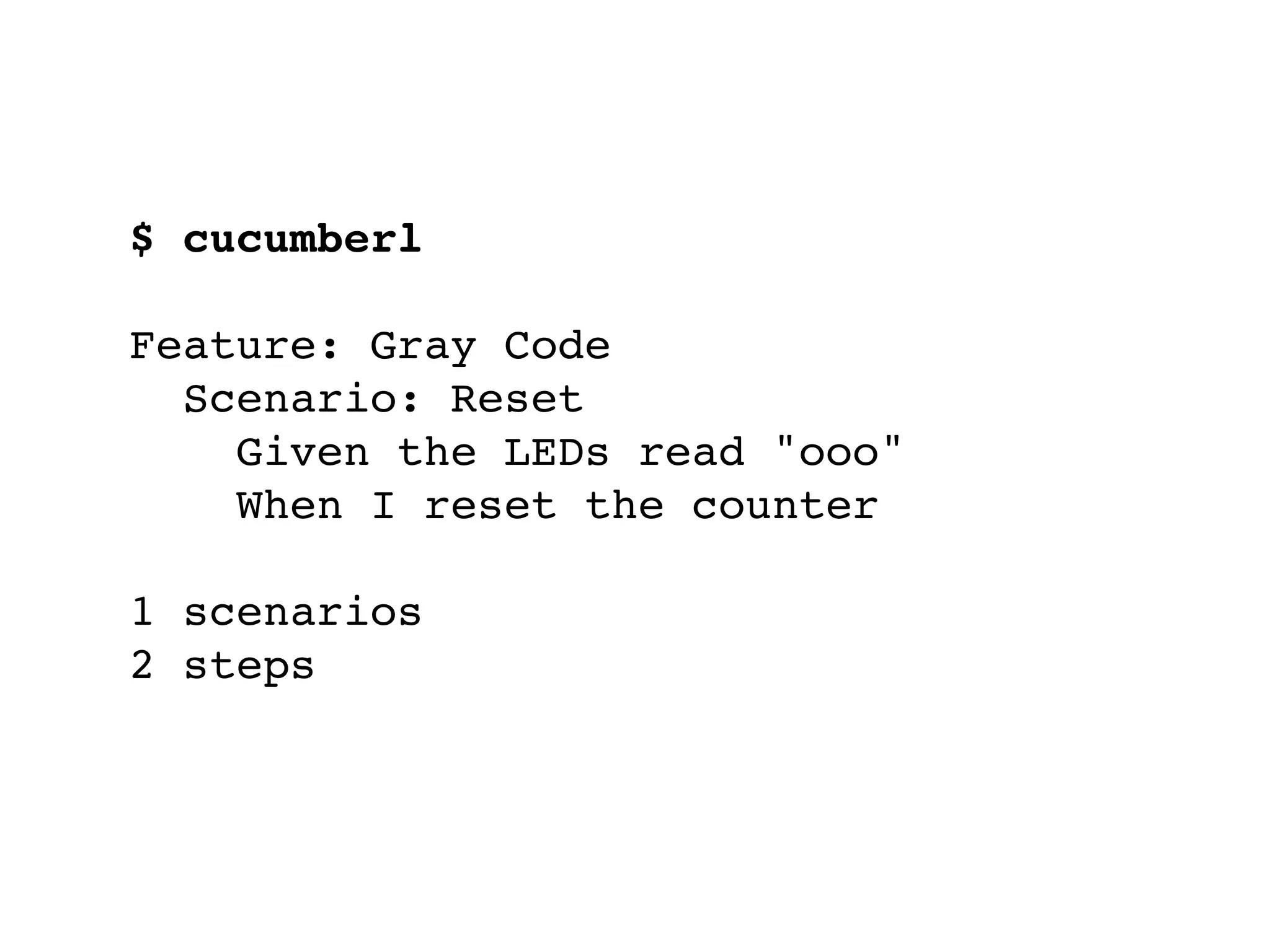


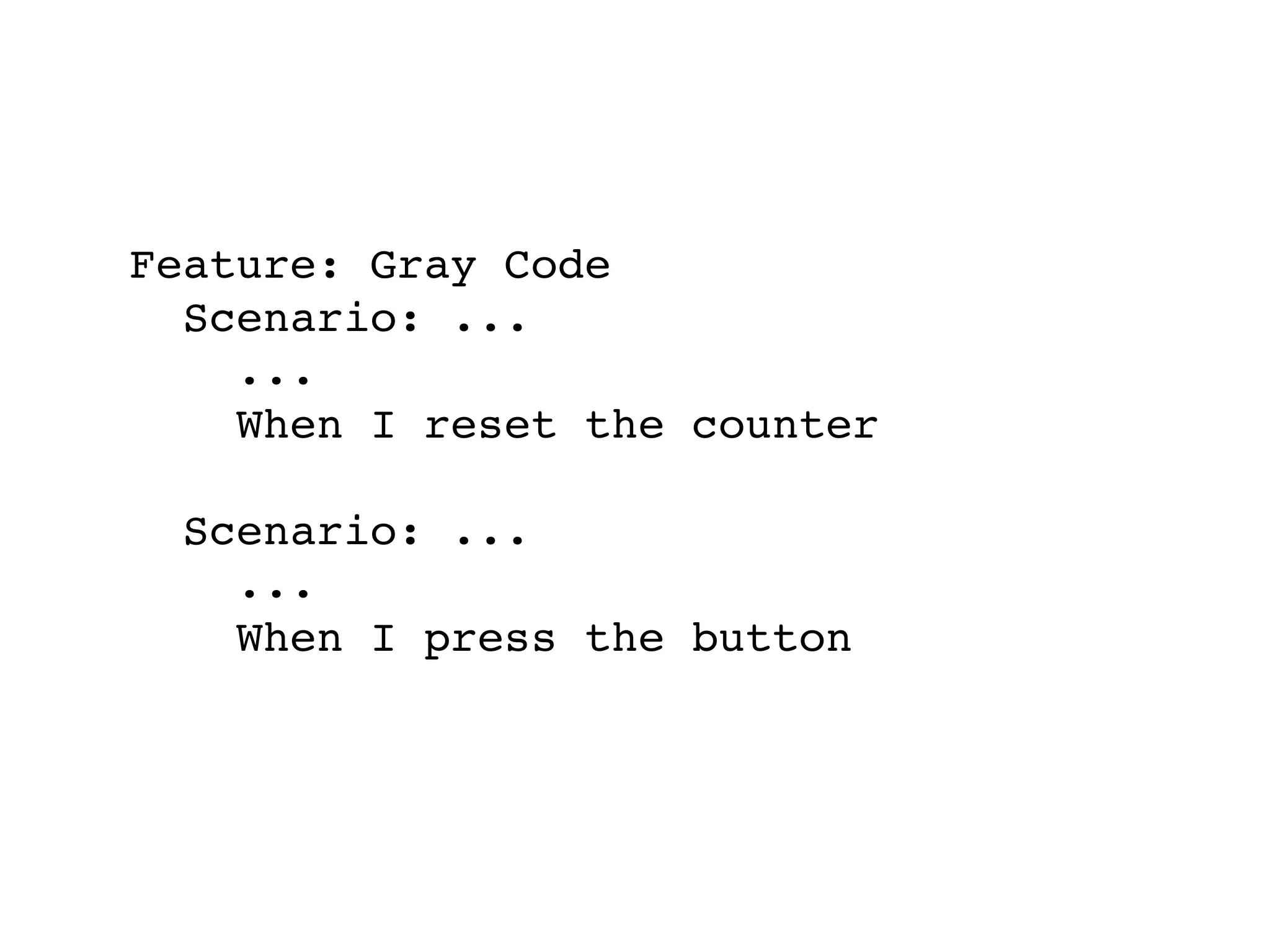
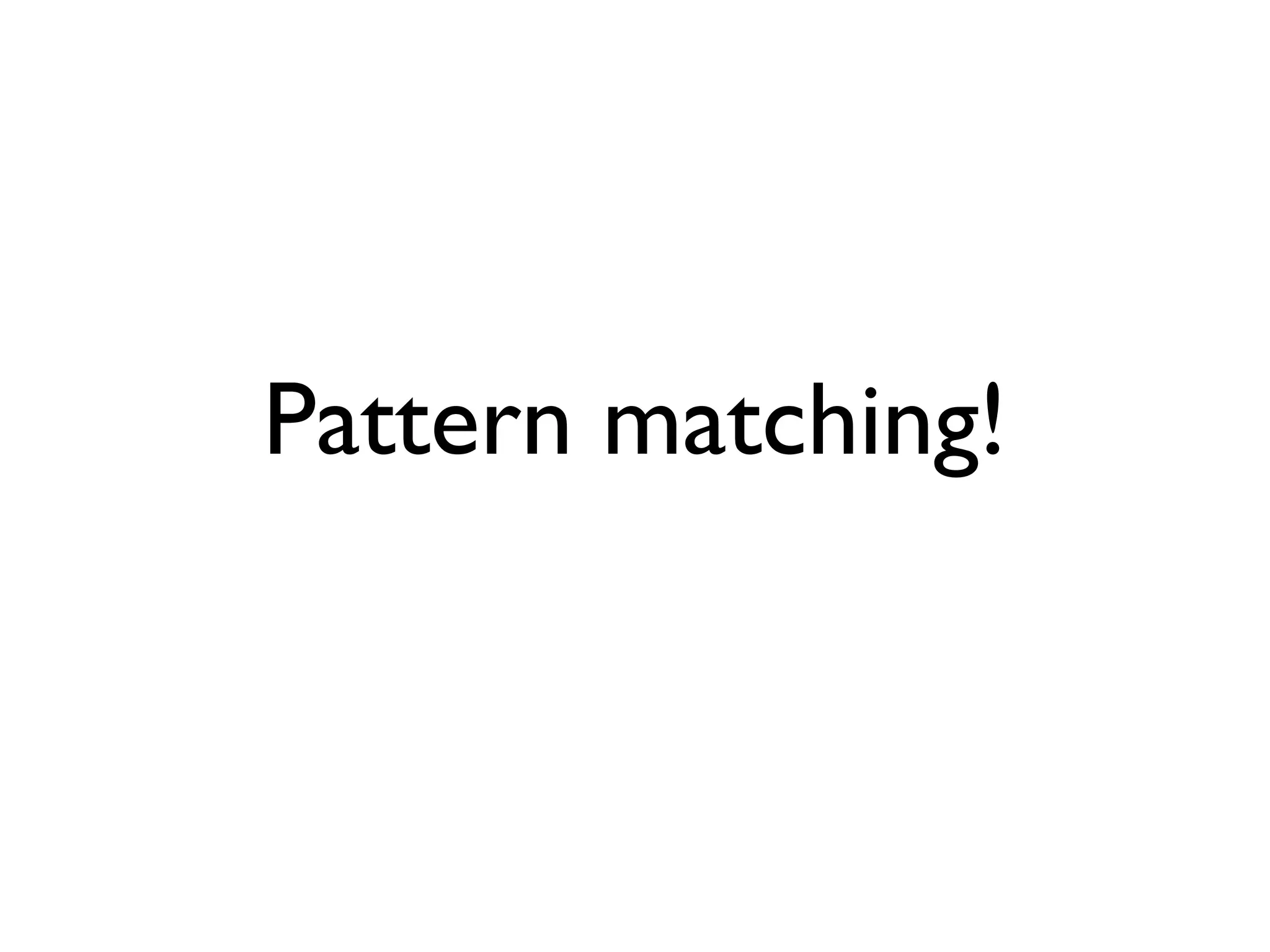
!['when'([i, reset, the, counter], State, _) ->
{ok, State};
'when'([i, press, the, button], State, _) ->
{ok, State}.](https://image.slidesharecdn.com/cukeupnyciandeesonelixirerlangandcucumberl-131003044011-phpapp01/75/Cukeup-nyc-ian-dees-on-elixir-erlang-and-cucumberl-33-2048.jpg)
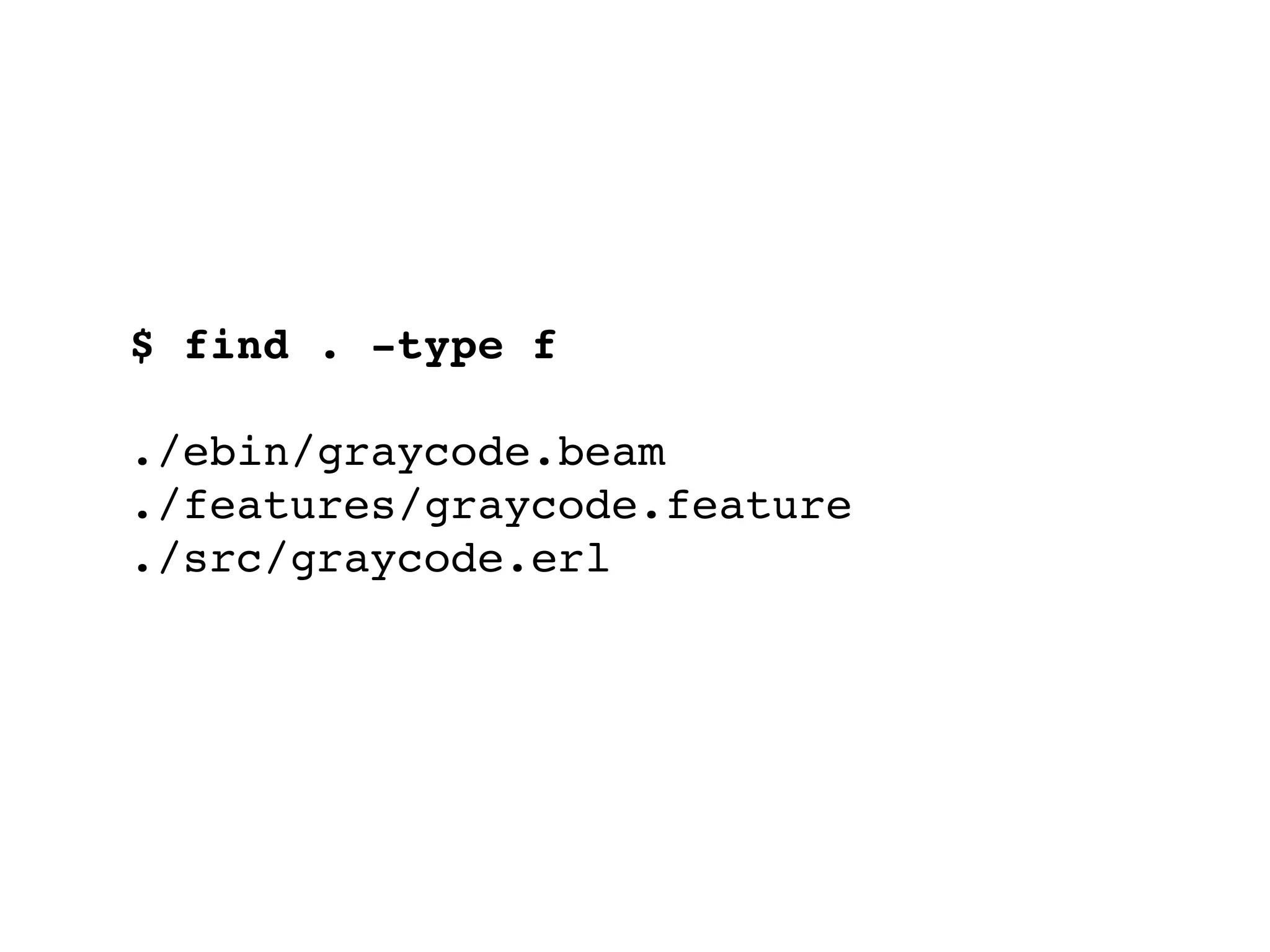
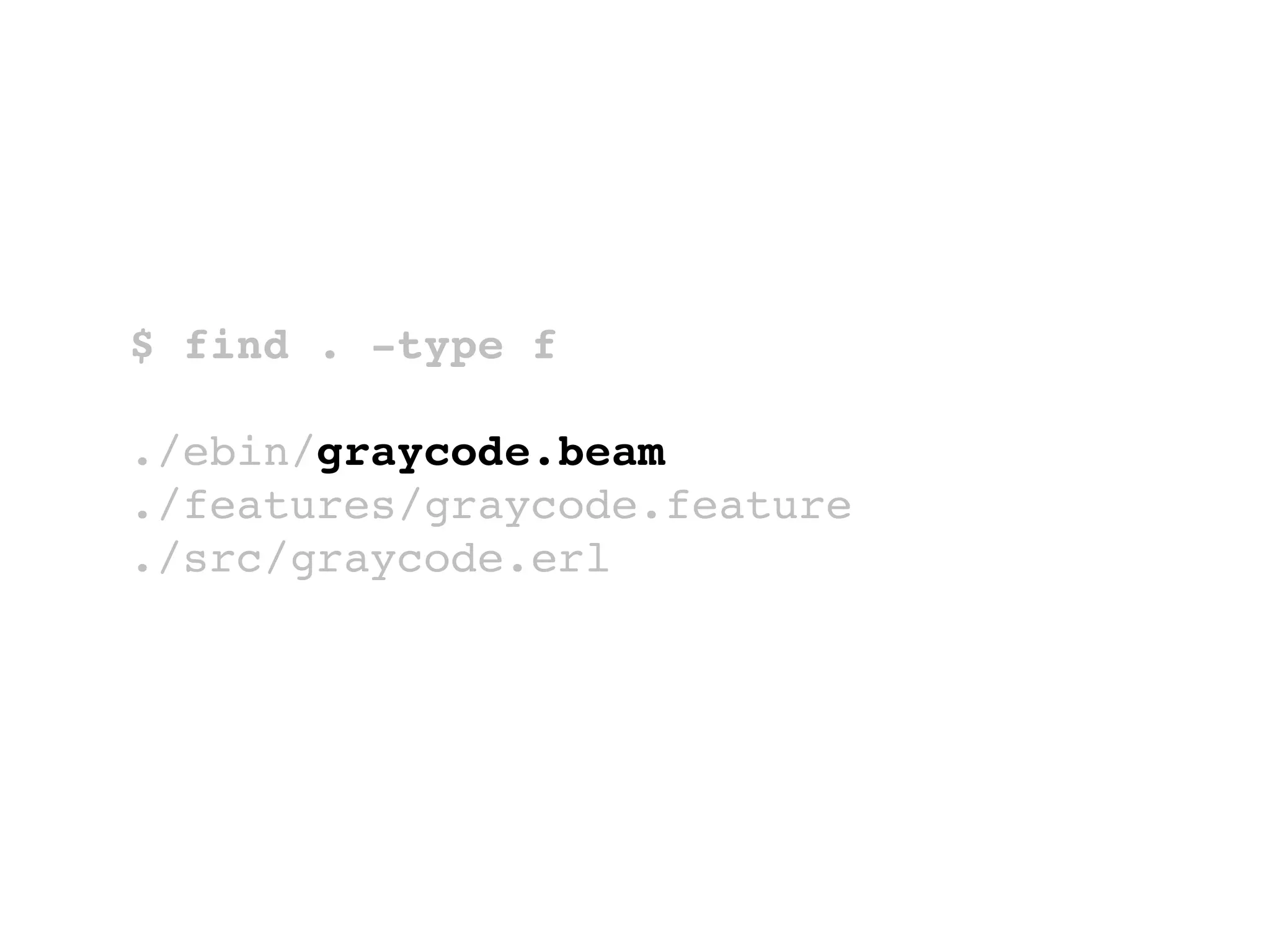


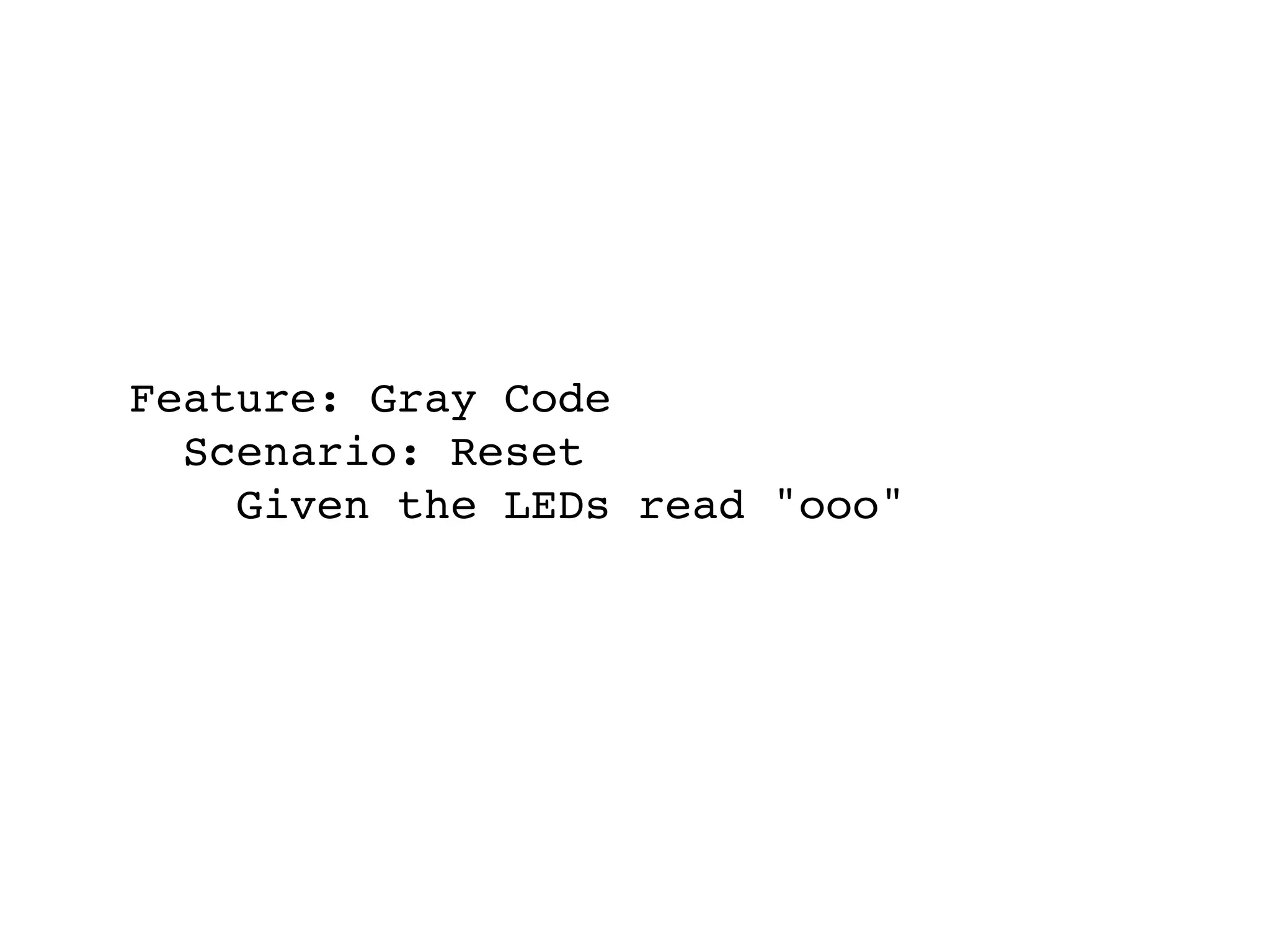
![-module(graycode).
-export([given/3, main/0]).
given([the, leds, read, _Input], State, _) ->
{ok, State}.
main() ->
cucumberl:run("./features/graycode.feature").](https://image.slidesharecdn.com/cukeupnyciandeesonelixirerlangandcucumberl-131003044011-phpapp01/75/Cukeup-nyc-ian-dees-on-elixir-erlang-and-cucumberl-39-2048.jpg)
![defmodule :graycode do
def given([:the, :leds, :read, input], _state, _) do
{:ok, input}
end
def main() do
:cucumberl.run("./features/graycode.feature")
end
end](https://image.slidesharecdn.com/cukeupnyciandeesonelixirerlangandcucumberl-131003044011-phpapp01/75/Cukeup-nyc-ian-dees-on-elixir-erlang-and-cucumberl-40-2048.jpg)
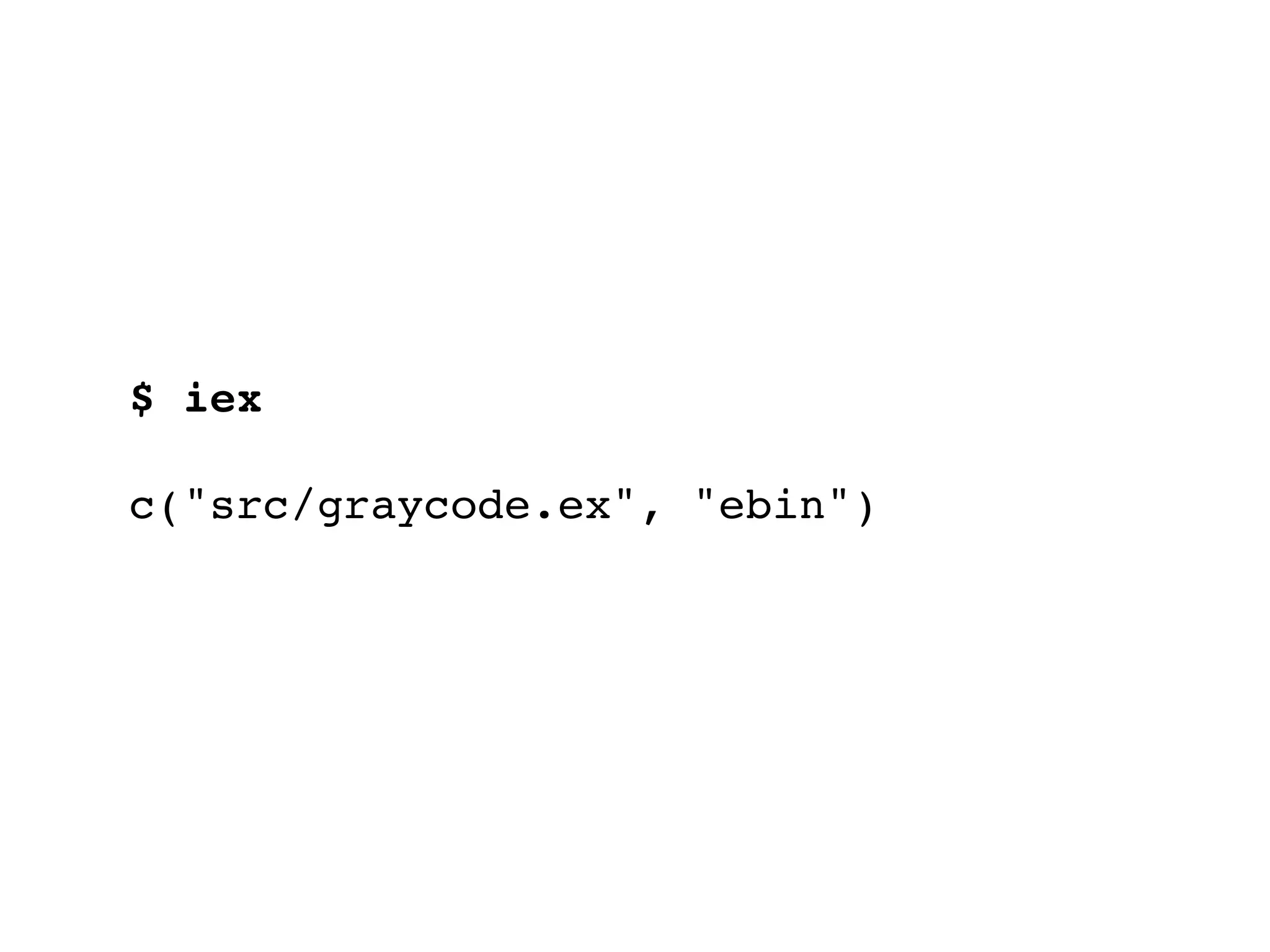
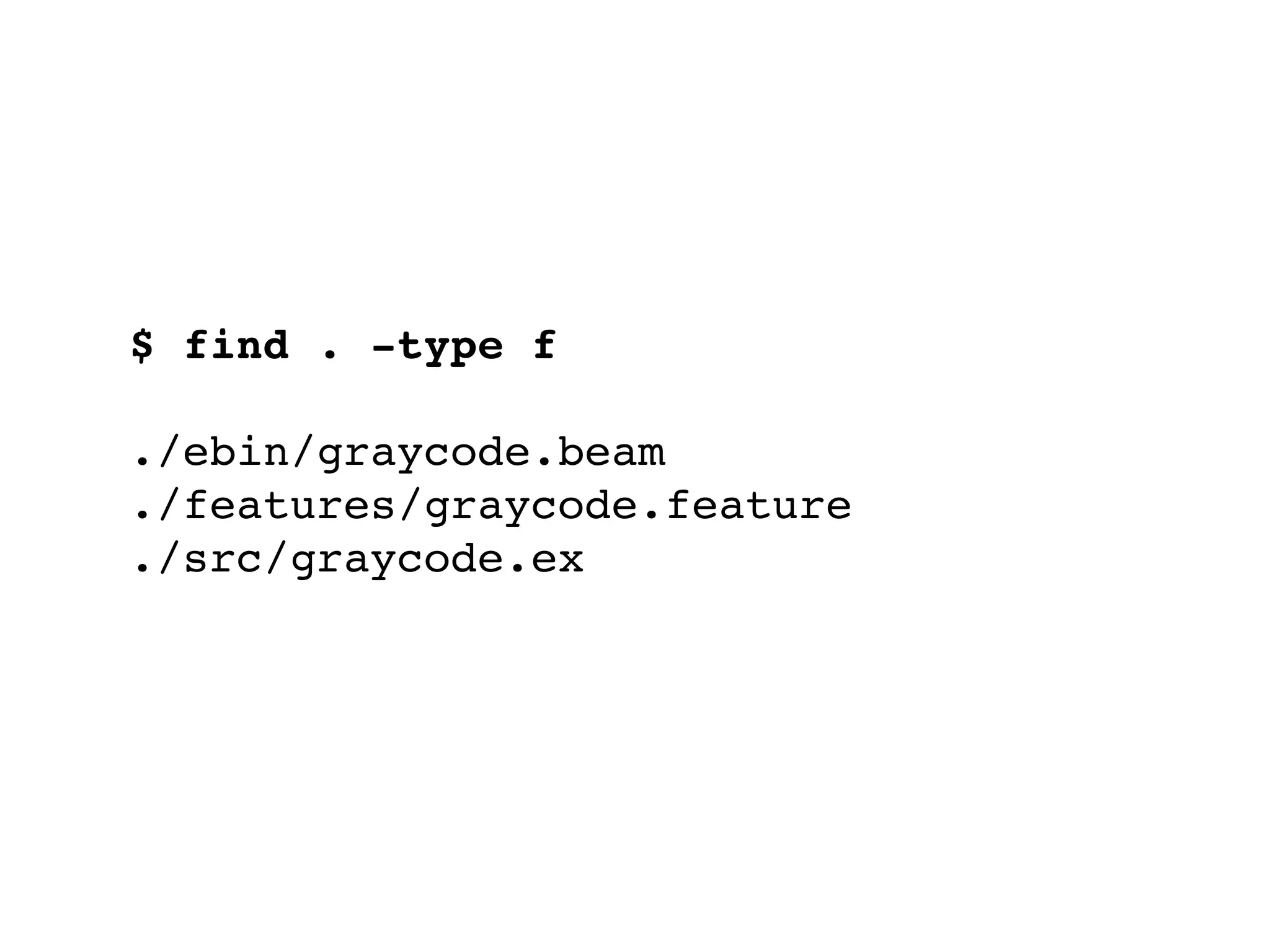
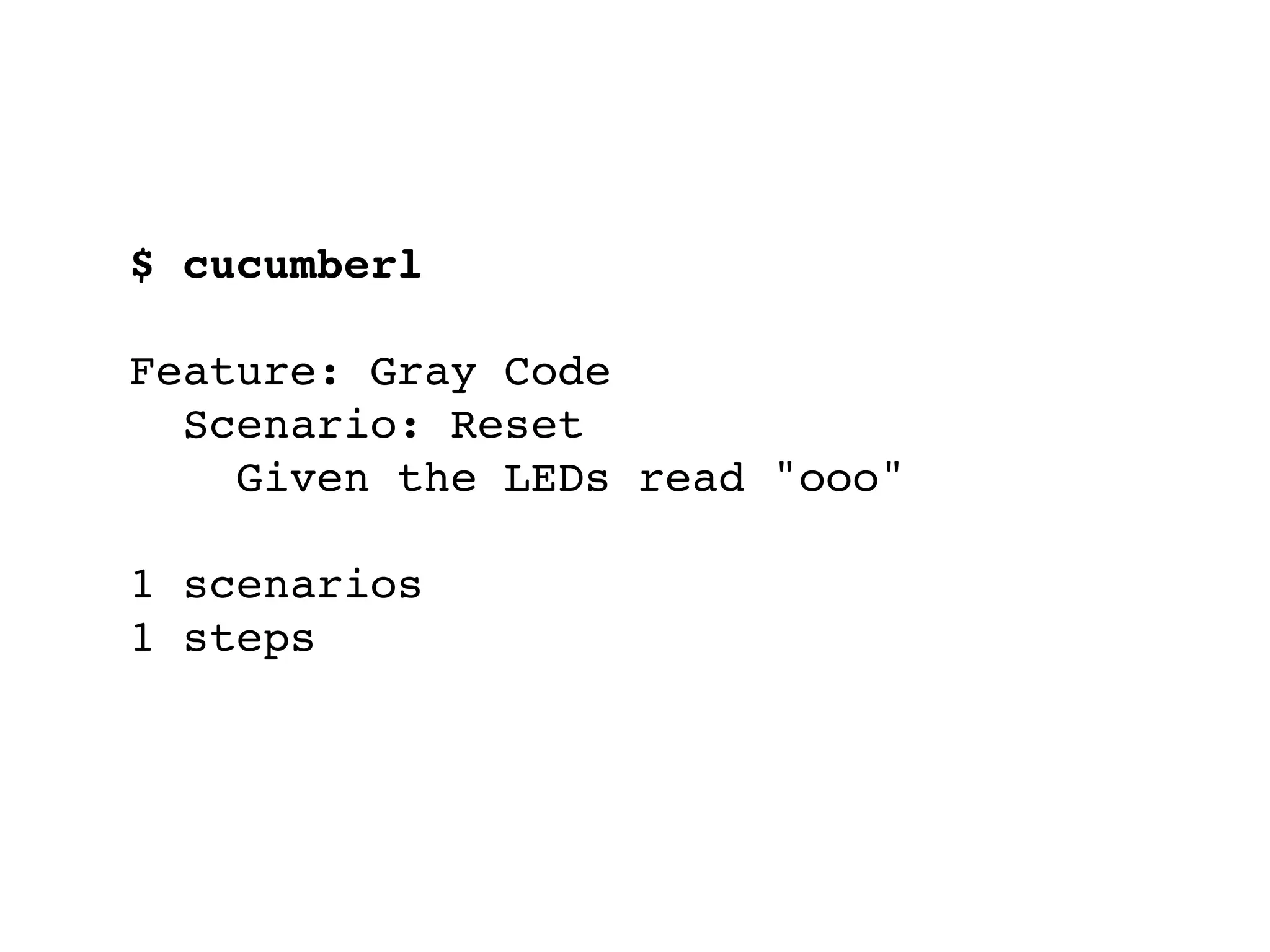
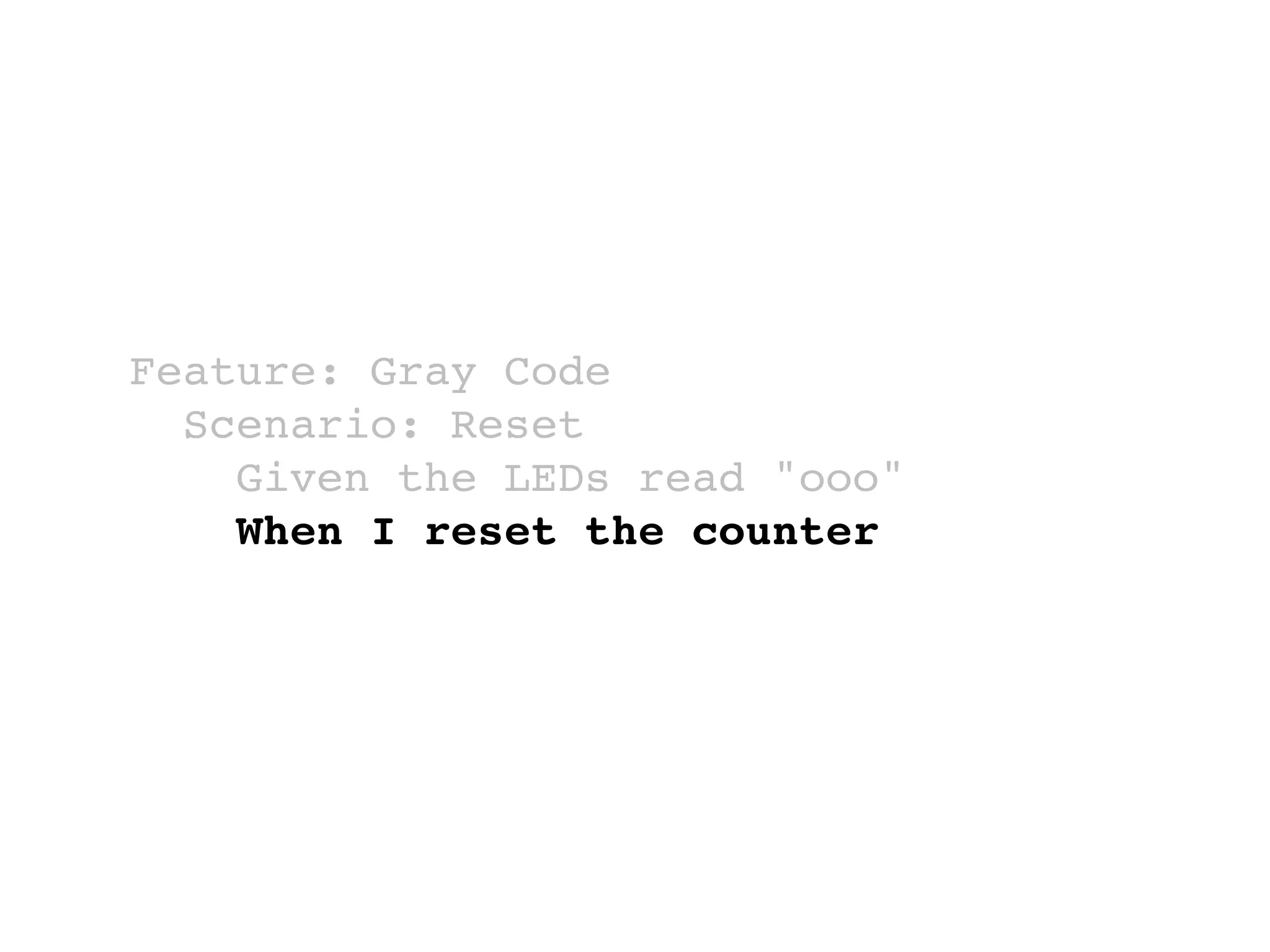
![---------NO-STEP--------
a step definition snippet...
'when'([i,reset,the,counter], State, _) ->
undefined.](https://image.slidesharecdn.com/cukeupnyciandeesonelixirerlangandcucumberl-131003044011-phpapp01/75/Cukeup-nyc-ian-dees-on-elixir-erlang-and-cucumberl-45-2048.jpg)
![---------NO-STEP--------
a step definition snippet...
'when'([i,reset,the,counter], State, _) ->
undefined.](https://image.slidesharecdn.com/cukeupnyciandeesonelixirerlangandcucumberl-131003044011-phpapp01/75/Cukeup-nyc-ian-dees-on-elixir-erlang-and-cucumberl-46-2048.jpg)
![def 'when'([:i, :reset, :the, :counter], _state, _) do
{:ok, '...'}
end
➡
== Compilation error on file src/graycode.ex ==
** (SyntaxError) ./src/graycode.ex:6: syntax error
before: ')'](https://image.slidesharecdn.com/cukeupnyciandeesonelixirerlangandcucumberl-131003044011-phpapp01/75/Cukeup-nyc-ian-dees-on-elixir-erlang-and-cucumberl-47-2048.jpg)
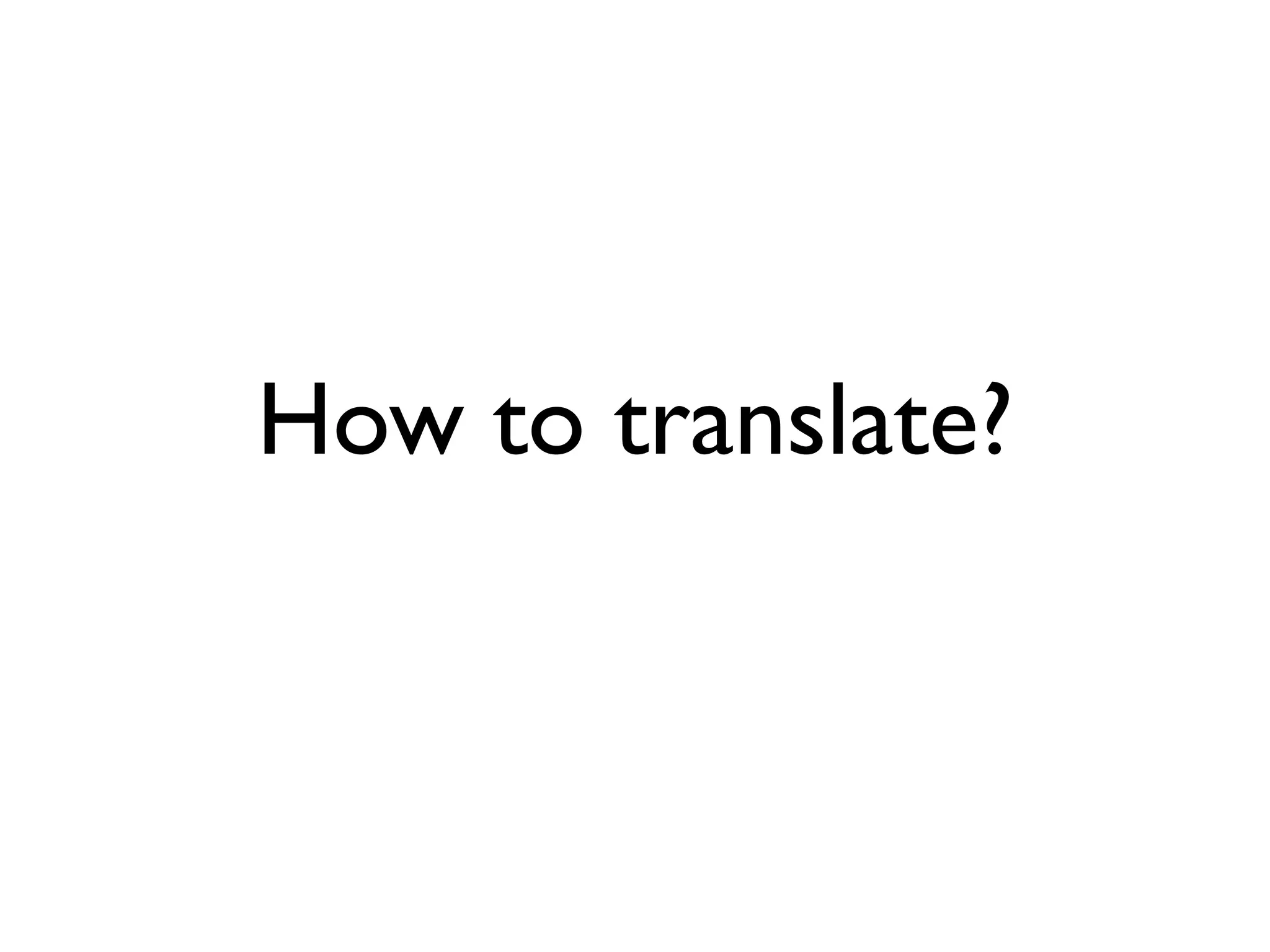

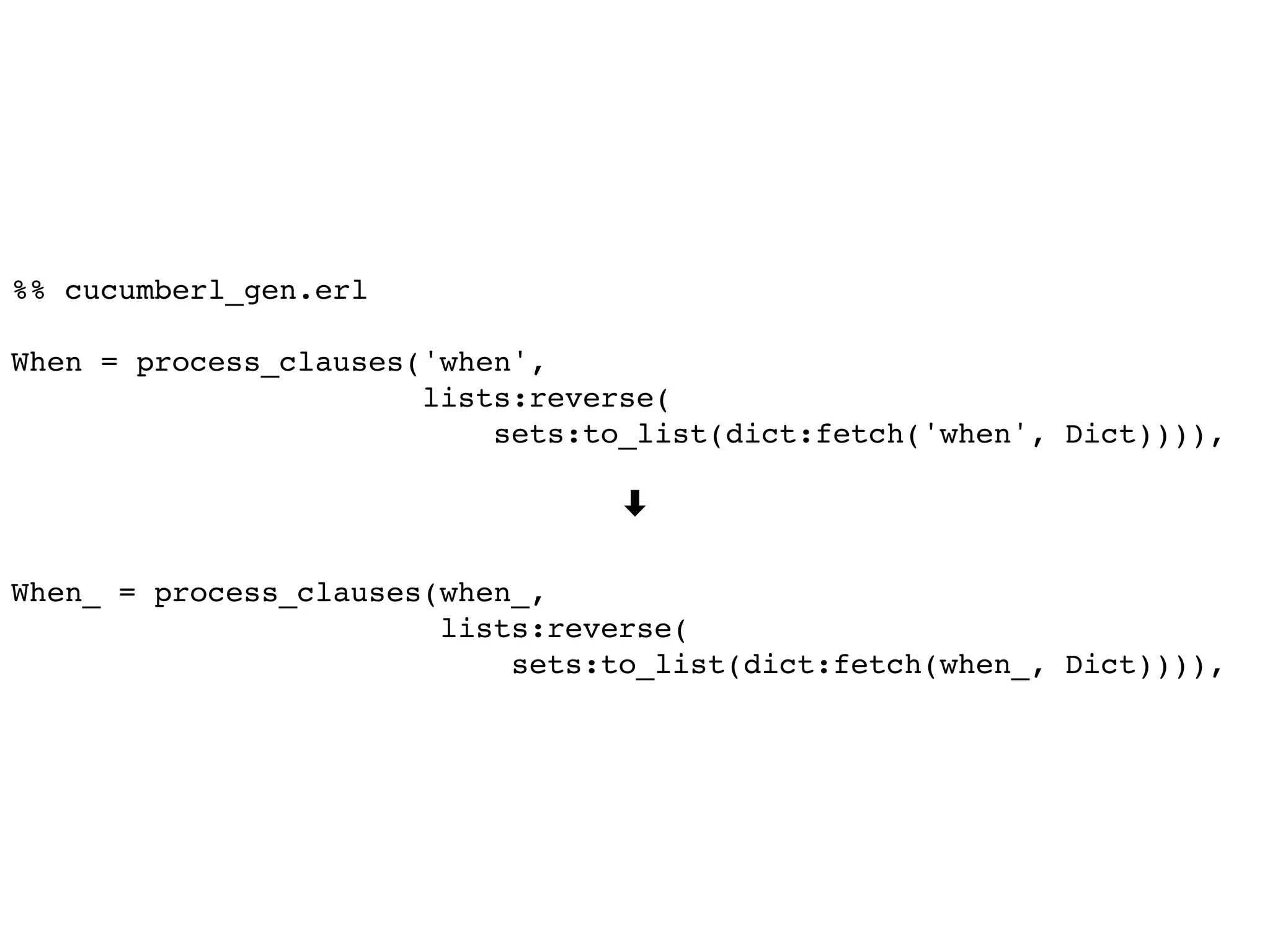
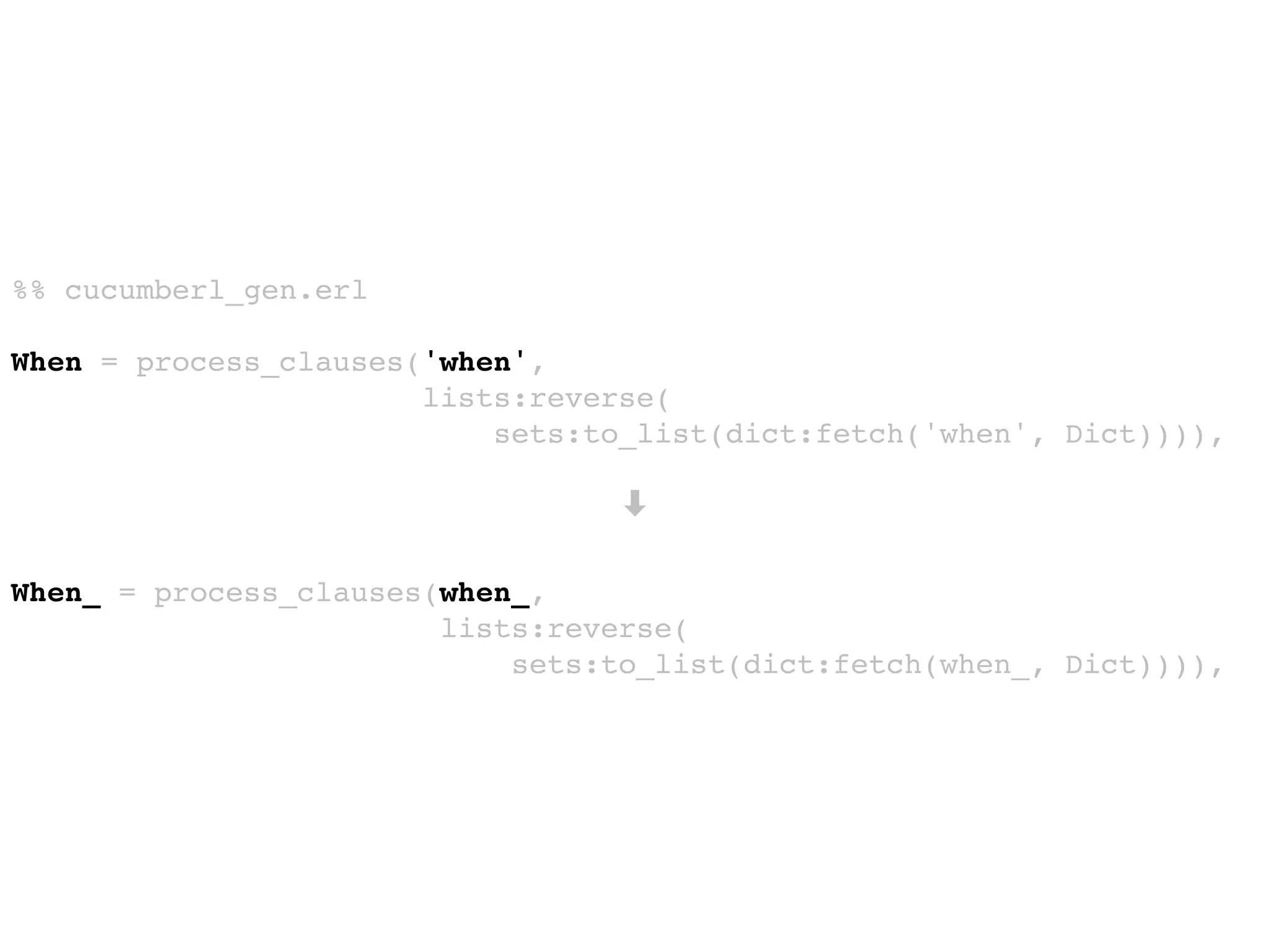
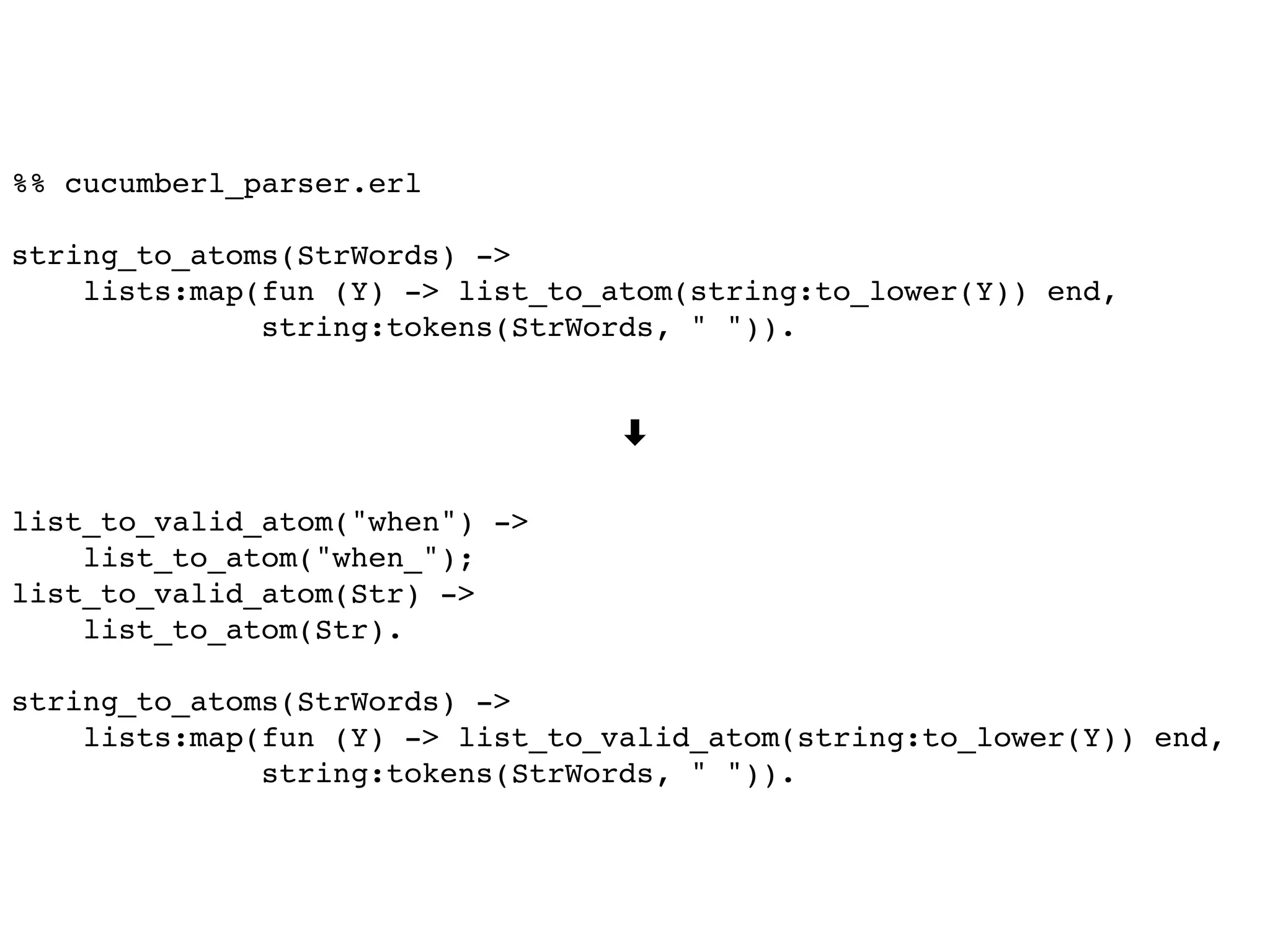
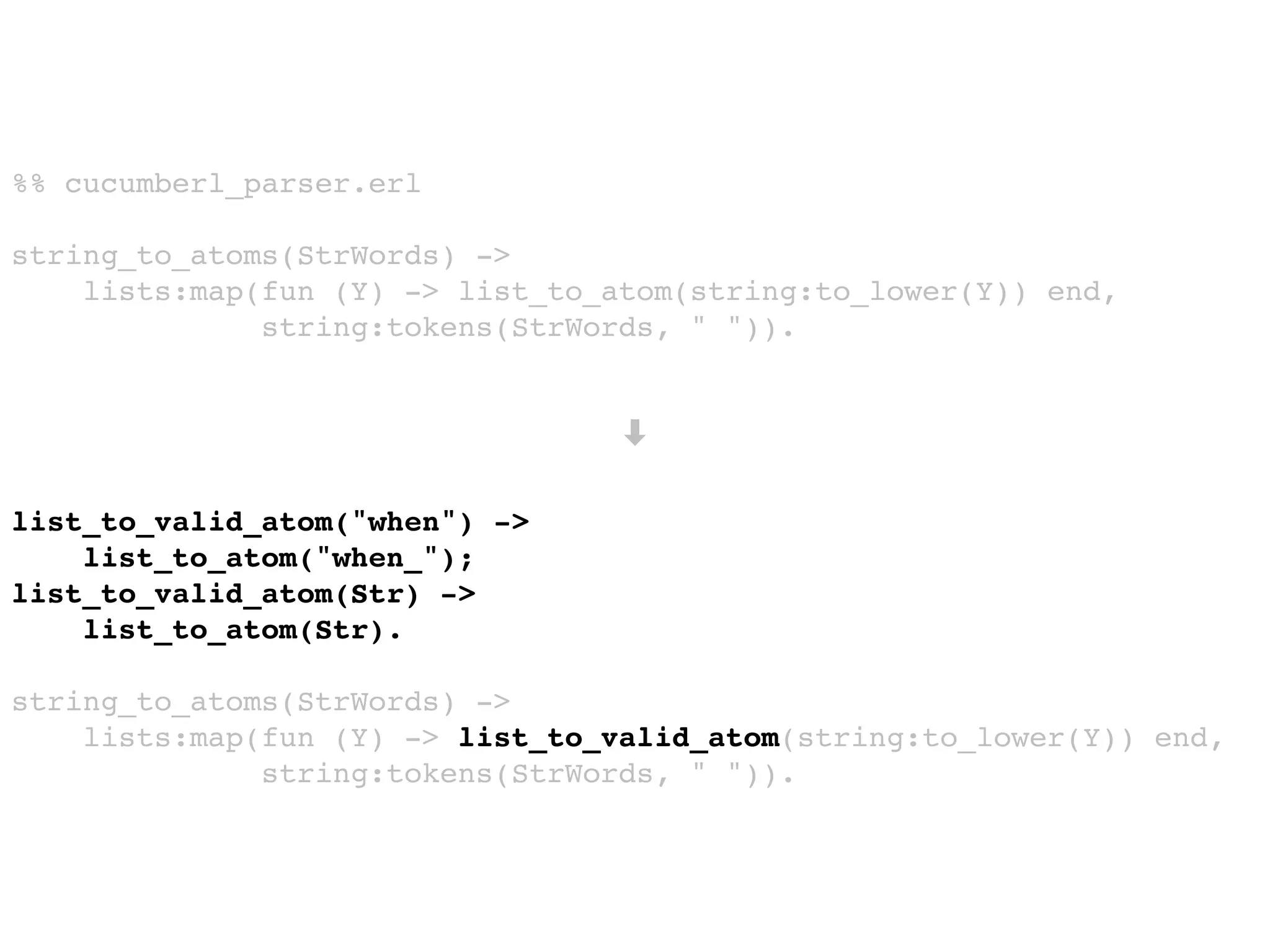
![def when_([:i, :press, :the, :button], state, _) do
{:ok, _next(state)}
end](https://image.slidesharecdn.com/cukeupnyciandeesonelixirerlangandcucumberl-131003044011-phpapp01/75/Cukeup-nyc-ian-dees-on-elixir-erlang-and-cucumberl-54-2048.jpg)
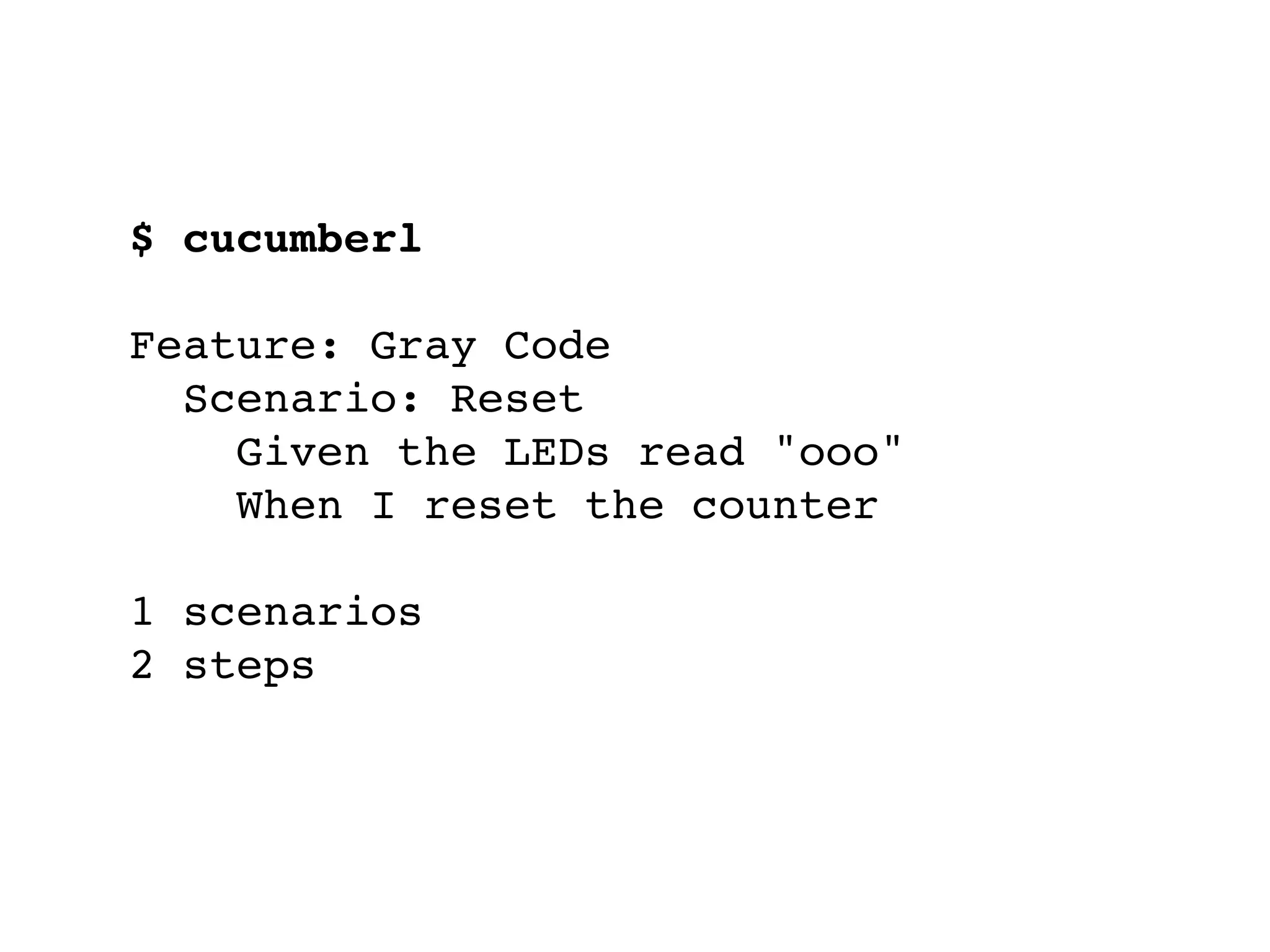
![def then([:the, :leds, :should, :read, expected],
state, _) do
{expected === state, state}
end](https://image.slidesharecdn.com/cukeupnyciandeesonelixirerlangandcucumberl-131003044011-phpapp01/75/Cukeup-nyc-ian-dees-on-elixir-erlang-and-cucumberl-56-2048.jpg)
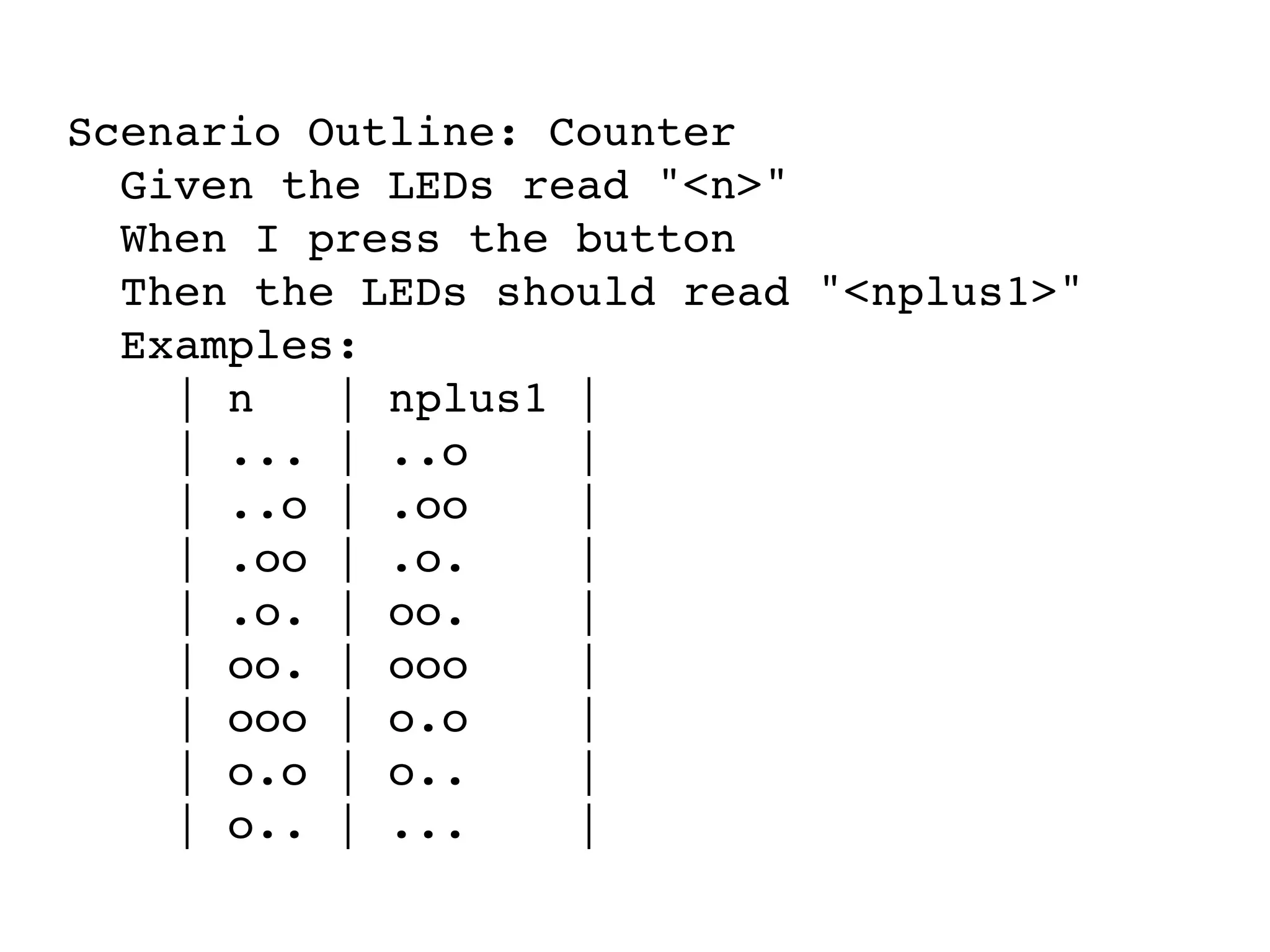
![def when_([:i, :press, :the, :button], state, _) do
{:ok, _next(state)}
end
defp _next(leds) do
case leds do
'...' -> '..o'
'..o' -> '.oo'
'.oo' -> '.o.'
'.o.' -> 'oo.'
'oo.' -> 'ooo'
'ooo' -> 'o.o'
'o.o' -> 'o..'
'o..' -> '...'
end
end](https://image.slidesharecdn.com/cukeupnyciandeesonelixirerlangandcucumberl-131003044011-phpapp01/75/Cukeup-nyc-ian-dees-on-elixir-erlang-and-cucumberl-58-2048.jpg)
